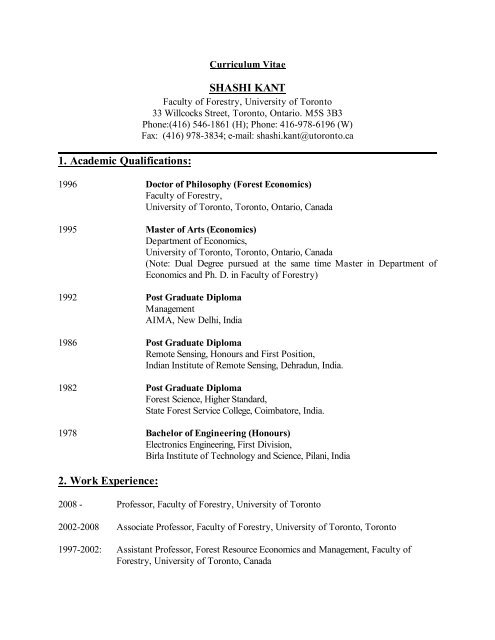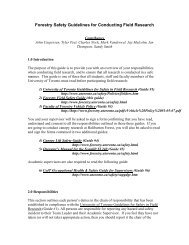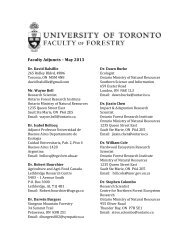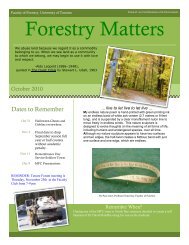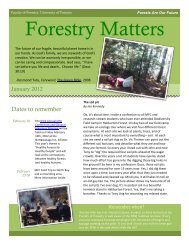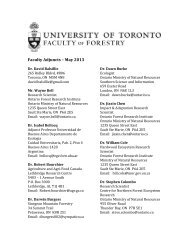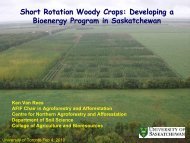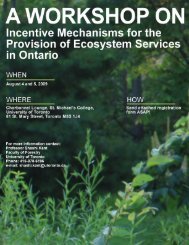Full CV July 2008 - Faculty of Forestry - University of Toronto
Full CV July 2008 - Faculty of Forestry - University of Toronto
Full CV July 2008 - Faculty of Forestry - University of Toronto
Create successful ePaper yourself
Turn your PDF publications into a flip-book with our unique Google optimized e-Paper software.
1. Academic Qualifications:<br />
Curriculum Vitae<br />
SHASHI KANT<br />
<strong>Faculty</strong> <strong>of</strong> <strong>Forestry</strong>, <strong>University</strong> <strong>of</strong> <strong>Toronto</strong><br />
33 Willcocks Street, <strong>Toronto</strong>, Ontario. M5S 3B3<br />
Phone:(416) 546-1861 (H); Phone: 416-978-6196 (W)<br />
Fax: (416) 978-3834; e-mail: shashi.kant@utoronto.ca<br />
1996 Doctor <strong>of</strong> Philosophy (Forest Economics)<br />
<strong>Faculty</strong> <strong>of</strong> <strong>Forestry</strong>,<br />
<strong>University</strong> <strong>of</strong> <strong>Toronto</strong>, <strong>Toronto</strong>, Ontario, Canada<br />
1995 Master <strong>of</strong> Arts (Economics)<br />
Department <strong>of</strong> Economics,<br />
<strong>University</strong> <strong>of</strong> <strong>Toronto</strong>, <strong>Toronto</strong>, Ontario, Canada<br />
(Note: Dual Degree pursued at the same time Master in Department <strong>of</strong><br />
Economics and Ph. D. in <strong>Faculty</strong> <strong>of</strong> <strong>Forestry</strong>)<br />
1992 Post Graduate Diploma<br />
Management<br />
AIMA, New Delhi, India<br />
1986 Post Graduate Diploma<br />
Remote Sensing, Honours and First Position,<br />
Indian Institute <strong>of</strong> Remote Sensing, Dehradun, India.<br />
1982 Post Graduate Diploma<br />
Forest Science, Higher Standard,<br />
State Forest Service College, Coimbatore, India.<br />
1978 Bachelor <strong>of</strong> Engineering (Honours)<br />
Electronics Engineering, First Division,<br />
Birla Institute <strong>of</strong> Technology and Science, Pilani, India<br />
2. Work Experience:<br />
<strong>2008</strong> - Pr<strong>of</strong>essor, <strong>Faculty</strong> <strong>of</strong> <strong>Forestry</strong>, <strong>University</strong> <strong>of</strong> <strong>Toronto</strong><br />
2002-<strong>2008</strong> Associate Pr<strong>of</strong>essor, <strong>Faculty</strong> <strong>of</strong> <strong>Forestry</strong>, <strong>University</strong> <strong>of</strong> <strong>Toronto</strong>, <strong>Toronto</strong><br />
1997-2002: Assistant Pr<strong>of</strong>essor, Forest Resource Economics and Management, <strong>Faculty</strong> <strong>of</strong><br />
<strong>Forestry</strong>, <strong>University</strong> <strong>of</strong> <strong>Toronto</strong>, Canada
1988-1991: Assistant Pr<strong>of</strong>essor, Forest Resource Economics, Indian Institute <strong>of</strong> Forest<br />
Management, Bhopal, India<br />
1987-88 Officer on Special Duty: Wasteland Development, Uttar Pradesh (U.P.)<br />
Government Secretariat, Lucknow, India:<br />
1986-87 Divisional Director, Social <strong>Forestry</strong> Division, Faizabad, U.P., India.<br />
1984-86 Forest Economist, U.P. Forest Department, Lucknow, India<br />
1982-84 Assistant Conservator <strong>of</strong> Forests, Forest Training Institute, Haldwani, U.P., India<br />
3.0 Research Awards and/or Prizes:<br />
3.1 Canadian Institute <strong>of</strong> <strong>Forestry</strong> (CIF) Scientific Achievement Award (2007): This award<br />
has the objective <strong>of</strong> encouraging innovation, exploration, application, and excellence in forest<br />
research. The CIF recognizes one scientist every year for innovative and outstanding<br />
achievements in forestry research in Canada. In the last 20 years, including 2007, only two forest<br />
economists have received this award.<br />
3.2 International Union <strong>of</strong> <strong>Forestry</strong> Research Organization’s (IUFRO) Scientific<br />
Achievement Award (2005): The purpose <strong>of</strong> the Scientific Achievement Award is to recognise<br />
distinguished individual scientific achievement within the fields <strong>of</strong> research covered by the Union.<br />
Kant received this award for his overall contributions to the field <strong>of</strong> economics <strong>of</strong> sustainable<br />
management <strong>of</strong> natural resources. The IUFRO Scientific Achievement Awards are given every five<br />
years, and about 6-8 people receive this award in each cycle. In the history <strong>of</strong> IUFRO, there are<br />
only two other forest economists who have received this award.<br />
3.3 Premier’s Research Excellence Award (PREA) (2004): Shashi Kant received Premier’s<br />
Research Excellence Award (PREA) for his research on Economics <strong>of</strong> Sustainable Forest<br />
Management: Social Choice and Agent-Based Approach. The PREA were created in 1998 to help<br />
Ontario's world-class researchers attract talented people to their research teams and to encourage<br />
innovation among the province's brightest young researchers at universities, colleges, hospitals<br />
and research institutes. Shashi is one <strong>of</strong> very few social scientists, and probably the only<br />
economist, who has received this award.<br />
At the time <strong>of</strong> the creation <strong>of</strong> PREA, the Premier <strong>of</strong> Ontario called the PREA winner as<br />
the province’s finest achievers, and the Nobel Prize winners <strong>of</strong> the future. The Premier observed:<br />
“We recognize the importance <strong>of</strong> science, technology and innovation. That’s why we are<br />
creating the Council, and that’s why we are here tonight celebrating the accomplishments<br />
<strong>of</strong> our province’s finest achievers, the Nobel Prize winners <strong>of</strong> the future. The Premier’s<br />
Research Excellence Awards encourage our world-class researchers to stay here in<br />
Ontario and they help ensure that Ontario continues to develop cutting-edge technologies<br />
that support a strong and competitive economy.”<br />
2
3.4 Nomination to the Blue Planet Award (2006): In 2006, Kant was nominated for the Blue<br />
Planet Award, an international environmental award. The nominations are restricted and only<br />
selected people have the authority to nominate people for this award. The awards are given by<br />
The Asahi Glass Foundation annually to two individuals or organizations that have made<br />
outstanding scientific contributions to global environmental conservation.<br />
4.0 Research Grants:<br />
Period $ amount Project Name, Funding Agency, and Nature <strong>of</strong> Grant<br />
2007-<strong>2008</strong> A Global Vision <strong>of</strong> <strong>Forestry</strong> in the 21 st Century<br />
(Grants to support an International Conference on the subject)<br />
Can$70,000 Canadian International Development Agency<br />
Can$10,000 Ivey Foundation<br />
Can$23,000 Sustainable Forest Management Network<br />
US$25,000 Ford Foundation<br />
2007-2011 Can$110,000 Multi-agent Modelling <strong>of</strong> Forest Management in Ontario<br />
Natural Science and Engineering Research Council (NSERC)<br />
(Individual Grant)<br />
2007-2009 Can$160,000 Economics <strong>of</strong> Aboriginal Land Use<br />
Sustainable Forest Management Network, Edmonton<br />
(Group Grant, I am the Principal Investigator, My share is<br />
$120,000)<br />
2007-2010 Can$225,000 Evaluating the Ecological, Economic, and Social Trade-<strong>of</strong>fs <strong>of</strong><br />
Managing for various Plants and Other NTFPs<br />
(Group Grant, I am one <strong>of</strong> the Co-Investigator, My share is $40,000)<br />
2007-2010 Can$75,000 Silviculture Effectiveness and Consequences <strong>of</strong> Using Vegetation<br />
Management Alternatives in Boreal and Temperate Coniferous<br />
Forests: A Synthesis<br />
(Group Grant, I am one <strong>of</strong> the Co-Investigator, My share is $18,500)<br />
2006-2009 Can$570,000 .Market and Institutional Structures, Economic Welfare, and the<br />
Global Competitiveness <strong>of</strong> the Canadian Forest Industry;<br />
Sustainable Forest Management Network, Edmonton<br />
(Group Grant, I am the Principal Investigator, My share is<br />
$280,000)<br />
2005-<strong>2008</strong> Can$472,000 A Participatory Approach to Aboriginal Tenure Reform in<br />
Canada<br />
Sustainable Forest Management Network, Edmonton,<br />
3
(Group Grant, My Share is $70,000)<br />
2004-2009 Can$100,000 Economics <strong>of</strong> Sustainable Forest Management: Social Choice and<br />
Agent-Based Approach<br />
Ministry <strong>of</strong> Science and Technology, Ontario, Canada<br />
(Individual Grant)<br />
2005-2006 US$60,000 Developing a Comprehensive Understanding <strong>of</strong> Environment for<br />
Development<br />
United Nations Environment Program, Washington DC<br />
(Individual Grant)<br />
2002-2004 Economics <strong>of</strong> Sustainable Forest Management (Grants in the<br />
Support <strong>of</strong> an International Conference on this subject)<br />
Can$40,000 Canadian Forest Service<br />
Can$31,600 Ford Foundation<br />
Can$10,000 Weyerhaeuser Canada<br />
Can$10,000 International Paper<br />
Can$5,000 Living Legacy Trust<br />
Can$5,000 Ontario Ministry <strong>of</strong> Natural Resources<br />
Can$5,000 Forest Product Association <strong>of</strong> Canada<br />
Can$5,000 SFMN, Edmonton, Alberta<br />
2002-2003 US$50,000 A Global Assessment <strong>of</strong> Protected Areas on International<br />
Boundaries<br />
United Nations Environment Programmes, Nairobi, Kenya<br />
(Individual Grant)<br />
2003-2006 Can$68,000 Sustainable Forest Management through Co-management in<br />
Northern Ontario (Phase II): Northern Boreal Initiative.<br />
Sustainable Forest Management Network, Edmonton<br />
(Individual Grant)<br />
2002-2006 Can$76,000 Forest-level Modelling for Sustainable Management <strong>of</strong> Unevenaged<br />
Hardwood Forests<br />
Natural Sciences and Engineering Research Council (NSERC)<br />
(Individual Grant)<br />
2001-2004 Can$79,000 Public Participation through Local Citizens Committees in North<br />
-western Ontario<br />
Sustainable Forest Management Network (SFMN), Edmonton<br />
(Group Grant, I was the Principal Investigator, My share was<br />
$79,000)<br />
2001-2004 Can$126,000 Sustainable Forest Management through Co-management<br />
in North-western Ontario.<br />
4
CFS/NSERC/SSHRC Partnership Program<br />
(Individual Grant)<br />
2001-2002 Can$25,000 International Workshop on Natural Capital, Poverty, and<br />
Development<br />
The Canadian International Development Agency (CIDA)<br />
(Conference Grant)<br />
2001-2002 US$15,000 Organizational Inertia in the Forest Department <strong>of</strong> India<br />
Ford Foundation, New Delhi, India<br />
(Individual Grant)<br />
2000-2003 Can$120,000 Sustainable Forest Management through Co-management<br />
in North-western Ontario.<br />
Sustainable Forest Management Network (SFMN), Edmonton,<br />
(Group Grant, I was the Principal Investigator, My share was<br />
$120,000)<br />
2000-2003 Can$31,000 Sustainable Forest Management through Co-management<br />
in North-western Ontario.<br />
Bowater, Weyerhaeuser, and KBM<br />
(Group Grant, I was the Principal Investigator, My share was<br />
$31,000)<br />
1999-2002 Can$44,000 Derived Supply Curves <strong>of</strong> Biodiversity <strong>of</strong> Uneven-aged<br />
Forests <strong>of</strong> the Great Lakes-St. Lawrence Region <strong>of</strong><br />
Ontario.<br />
Social Science and Humanities Research Council (SSHRC)<br />
(Individual Grant)<br />
1998-2002 Can$70,000 Stochastic modelling for sustainable management <strong>of</strong> uneven-aged<br />
forests<br />
Natural Sciences and Engineering Research Council (NSERC)<br />
(Individual Grant)<br />
1998-2001 Can$30,000 Valuation <strong>of</strong> biodiversity in the Great Lakes- St. Lawrence<br />
forests <strong>of</strong> Ontario.<br />
Connaught New Staff Matching Grants, <strong>University</strong> <strong>of</strong> <strong>Toronto</strong><br />
(Individual Grant)<br />
1999-2000 Can$10,000 Incorporating aboriginal perspective in forestry curricula:<br />
building on experience and relationships with First Nation<br />
communities<br />
<strong>University</strong> <strong>of</strong> <strong>Toronto</strong>, <strong>Toronto</strong><br />
(Individual Grant)<br />
5
1998-2000 US$18,228 A comparative study <strong>of</strong> bamboo institutions and production to<br />
consumption systems in China and India.<br />
International Network for Bamboo and Rattan (INBAR), Beijing,<br />
China<br />
(Individual Grant)<br />
1998-1999 Can$2,557 Local institutions and sustainable development <strong>of</strong> local<br />
communities. (Vice-President's SSHRC Fund)<br />
(Individual Grant)<br />
1997-1998 Can$3,645 Local institutions and economic reform for the development<br />
<strong>of</strong> Aboriginal communities (A comparative study <strong>of</strong> India and<br />
Canada)<br />
Shastri Indo-Canadian Institute, Alberta.<br />
Individual Grant)<br />
1994-1996 US$18,000 Joint forest management: some economic issues.<br />
Ford Foundation, New Delhi, India.<br />
(Individual Grant)<br />
1993-95 US$15,000 Role <strong>of</strong> wild biological resources in economic development<br />
<strong>of</strong> local communities<br />
Biodiversity Support Program, Washington, D.C.<br />
(Individual Grant)<br />
5. Publications and Presentations:<br />
5.1 Books<br />
1. Kant, S., and R. A. Berry (eds.) 2005. Economics, Sustainability, and Natural Resources:<br />
Economics <strong>of</strong> Sustainable Forest Management. Dordrecht: Springer, 272 p.<br />
2. Kant, S., and R. A. Berry (eds.) 2005. Institutions, Sustainability, and Natural Resources:<br />
Institutions for Sustainable Forest Management. Dordrecht: Springer, 361 p.<br />
3. Kant, S., N. M. Singh., and K. Singh. 1991. Community Based Forest Management<br />
Systems: Case Studies from Orissa. Published by SIDA, ISO/Swedforest, and IIFM Bhopal.<br />
5.2 Translation <strong>of</strong> Research Work<br />
Yi Xie and Yali Wen. 2005. Chinese Translation, Kant, S. 2003. Extending the Boundaries <strong>of</strong><br />
Forest Economics (Forest Policy and Economics, 5, 39-56). <strong>Forestry</strong> Economics Journal<br />
5.3 Foreword and Prefaces<br />
6
1. Kant, S. 2007. Foreword. Geir, B. Asheim. Justifying, Characterizing, and Indicating<br />
Sustainability (pp. X-XI). Dordrecht: Springer.<br />
2. Kant, S. 2005. Preface <strong>of</strong> the Series. In S. Kant, and R. A. Berry (eds.) Sustainability, Economics,<br />
and Natural Resources: Economics <strong>of</strong> Sustainable Forest Management (pp. XV-XVI). Dordrecht:<br />
Springer.<br />
5.4 Refereed Book Chapters<br />
1. Kant, S. <strong>2008</strong>. Sustainable Development and Economics. In Pak, S. L. (Ed.) Global Change and<br />
Sustainable Development in Asia-Pacific Region. Cambridge <strong>University</strong> Press.<br />
2. Kant, S.2005. Economics <strong>of</strong> Woodfuels. State <strong>of</strong> the World’s Forests: 2005. FAO, Rome, pp. 98-<br />
105.<br />
3. Kant, S. 2005. Institutions, Sustainable Forest Management, and Post-Newtonian Economics.<br />
In S. Kant and R. A. Berry (eds.) Sustainability, Institutions, and Natural Resources: Institutions<br />
for Sustainable Forest Management (pp. 341-356). Dordrecht: Springer.<br />
4. Kant, S. 2005. Post Newtonian Economics and Sustainable Forest Management. In S. Kant,<br />
and R. A. Berry (eds.) Sustainability, Economics, and Natural Resources: Economics <strong>of</strong><br />
Sustainable Forest Management (pp.1-22). Dordrecht: Springer.<br />
5. Kant, S., and R. A. Berry. 2005. Sustainability, Economics, and Forest Management. In S.<br />
Kant, and R. A. Berry (eds.) Sustainability, Economics, and Natural Resources: Economics <strong>of</strong><br />
Sustainable Forest Management (pp.253-267). Dordrecht: Springer.<br />
6. Kant, S., and R. A. Berry. 2005. Sustainability, Institutions, and Forest Management. In S.<br />
Kant and R. A. Berry (eds.) Sustainability, Institutions, and Natural Resources: Institutions for<br />
Sustainable Forest Management (pp. 1-20). Dordrecht: Springer.<br />
7. Kant, S., and R. A. Berry. 2005. Institutions, Organizations, and External Setting: Dynamic <strong>of</strong><br />
Institutions. In S. Kant and R. A. Berry (eds.) Sustainability, Institutions, and Natural Resources:<br />
Institutions for Sustainable Forest Management (pp. 83-114). Dordrecht: Springer.<br />
8. Yaoqi Zhang and S Kant. 2005. Collective forests and forestland: physical asset rights versus<br />
economic rights. In Peter Ho (ed.) Developmental Dilemmas: Land Reform and Institutional<br />
Change in China (pp.283-307). London: Routledge. [change to TNR font]<br />
9. Kant, S. and E. Lehrer. 2004. A framework for institutional analysis <strong>of</strong> agro-forestry systems.<br />
In Janaki Alvalapati and Evan Mercer (eds). Valuing Agr<strong>of</strong>orestry Systems (pp.279-302).<br />
Dordrecht Kluwer.<br />
10. Bengston, D., and S Kant. 2004. Recent Trends & Issues Concerning Multiple Values and<br />
Forest Management in North America. In Forests in the Global Balance – Changing Paradigms.<br />
IUFRO, Austria.<br />
7
11. Yaoqi Zhang, Jussi Uusivuori, Jari Kuuluvainen, S Kant. 2003.The Extra-Sectoral Impacts on<br />
<strong>Forestry</strong> Development in Hainan, China. In William F Hyde et al. (eds.) China’s Forests: Global<br />
Lessons from Market Reforms (pp. 135-150). Washington, D.C.: RFF, and Bogor: CIFOR.<br />
12. Kant S. 2001. The Evolution <strong>of</strong> Forest Regimes in India and China: A Comparative Analysis.<br />
In Palo, M., Uusivuori, J. and Mery, G. (eds.), World Forests, Market and Policy. Kluwer<br />
Academic Publishers, the Netherlands. pp. 341-352.<br />
13. Kant, S. 2000. Path dependence, multiple euilibria, and adaptive efficiency in Forest Regimes in<br />
India. In H Johnston, R. C. Tremblay, and John R. Wood (eds.) South Asia between Turmoil and<br />
Hope. South Asia Council <strong>of</strong> Canadian Asian Studies Association and Shastri Indo-Canadian<br />
Institute, Calgery, Alberta. pp. 59-91.<br />
14. Kant, S., and Roshan Cooke. 1999. Minimising Conflict in joint forest management. In Daniel<br />
Buckles (ed.) "Cultivating Peace: Conflict and Collaboration in Natural Resource Management."<br />
IDRC, Ottawa and World Bank Institute, Washington, D.C. pp. 81-100.<br />
15. Kant, S. 1999. Forests and tribal economy. In Klaus Seeland and Franz Schmith (ed.) "Man in<br />
the Forest" DK Agencies, New Delhi. pp. 249-268.<br />
16. Kant, S. 1998. Socio-economic factors and dynamics <strong>of</strong> forest regimes in developing economies.<br />
Proceedings <strong>of</strong> the Symposium on "Institutional Aspects <strong>of</strong> Managerial Economics and Accounting<br />
in <strong>Forestry</strong>" Ostia/Rome. Pp307-336.<br />
5.5 Refereed Journal Articles<br />
1. Fenge, Y., and S. Kant. <strong>2008</strong>. Rent Capture Analysis <strong>of</strong> Ontario's Stumpage System Using an<br />
Enhanced Parity Bounds Model. Land Economics (In Press).<br />
2. Tang, X., S. Kant, S, Laaksonen-Craig., and E. Asinas. Measuring the competitiveness <strong>of</strong> the<br />
Canadian pulp and paper in the US Market. The Canadian Journal <strong>of</strong> Forest Research (In Press)<br />
3. Ha, Van. N., Kant, S., and Maclaren, V. <strong>2008</strong>. Shadow Prices <strong>of</strong> Environmental Outputs and<br />
Production Efficiency <strong>of</strong> Household-Level Paper Recycling Units in Vietnam. Ecological<br />
Economics, 65:98-110.<br />
4. Fenge, Y., and S. Kant. <strong>2008</strong>. Forest Level Analysis <strong>of</strong> Uneven-aged Hardwood Forests. The<br />
Canadian Journal <strong>of</strong> Forest Research, 38(2):376-393.<br />
5. Khajuria, R. S. Laaksonen-Craig, and S. Kant. <strong>2008</strong>. A marginal cost analysis <strong>of</strong> trade-<strong>of</strong>fs in<br />
old-growth preservation in Ontario. Forest Policy and Economics, 10,326-335<br />
6. Kant, S., and D. Brubacher. <strong>2008</strong>. Aboriginal expectations and perceived effectiveness <strong>of</strong><br />
forest management practices and forest certification in Ontario. The <strong>Forestry</strong> Chronicle,<br />
84(3):378-391.<br />
8
7. Kant, S. 2007. Sustainability, economics, and forest resources. <strong>Forestry</strong> Chronicle, 83(4); 478-<br />
481.<br />
8. Robson, M. and S. Kant. 2007. Structure <strong>of</strong> Causation and its Influence on Cooperation: A<br />
Comparative Study <strong>of</strong> Forest Management in Ontario, Canada. Forest Policy and Economics,<br />
10(1-2):70-81.<br />
9. Kumar, S, S Kant, and Terry L. Amburgey. 2007. Foresters’ Resistance to Community-based<br />
Forest Management: A Psychoanalytical Perspective. Administration and Society, 39(5):569-<br />
610.<br />
10. Robson, M., and S. Kant. 2007. The development <strong>of</strong> government agency and stakeholder<br />
cooperation: a comparative study <strong>of</strong> two Local Citizens Committee's (LCCs) participation in<br />
forest management in Ontario, Canada. Forest Policy and Economics, 9(8):1113-1133.<br />
11. Kant, S. 2007. Editorial: Sustainable Forest Management, Multiple Forest Values, and<br />
Economics. Forest Policy and Economics, 9(7):733-740.<br />
12. Shahi, C., and S. Kant. 2007. Evolutionary game theoretic approach to strategies <strong>of</strong> community<br />
members under Joint Forest Management Regime. Forest Policy and Economics, 9(7), 763-775.<br />
13. Misra, D., and S. Kant. 2007. Shadow prices and production efficiency analysis <strong>of</strong> the<br />
village-level production units <strong>of</strong> Joint Forest Management (JFM) in India. Forest Policy and<br />
Economics, 9(7):799-810.<br />
14. Kumar, S., and S. Kant. 2007. Exploded Logit Modeling <strong>of</strong> Stakeholders’ Preferences for<br />
Multiple Forest Values. Forest Policy and Economics, 9,516-526.<br />
15. Shahi, C., S. Kant., and F. Yang. 2006. The North-American S<strong>of</strong>twood Lumber Trade and the<br />
Law <strong>of</strong> One Price. Forest Science, 52(4)353-366<br />
16. Yang, F., S. Kant., C. Shahi. 2006. Market Performance <strong>of</strong> the Government Controlled but<br />
Market Evidence-Based Stumpage System in Ontario: A Co-integration Approach. Forest<br />
Science, 52(4):367-380<br />
17. Kumar, S. and S. Kant. 2006. Organizational Resistance to Participatory Approaches in<br />
Public Agencies: An Analysis <strong>of</strong> Forest Department's Resistance to Community-based Forest<br />
management. The International Public Management Journal, 9(2):141-173<br />
18. Ha, N Van, S. Kant, and V. Maclaren. 2006. Relative shadow prices <strong>of</strong> social capital for<br />
household-level paper recycling units in Vietnam. Ecological Economics, 57, 520-533.<br />
19. Lee, S., and S. Kant. 2006. Forest Co-management, Personal and Group Forest Values, and<br />
9
Perceptions <strong>of</strong> Group’s Forest Values in Northwestern Ontario. <strong>Forestry</strong> Chronicle, 82(4):512-<br />
520.<br />
20. Misra, D., and S. Kant. 2005. Economic Efficiency and Shadow Prices <strong>of</strong> Social and<br />
Biological Outputs <strong>of</strong> Village-Level Organizations <strong>of</strong> Joint Forest Management in Gujarat, India.<br />
Journal <strong>of</strong> Forest Economics, 11, 141-160.<br />
21. Shi, H. A. Singh, S. Kant, Z. Zhu., and E. Waller. 2005. Integrating Habitat Status, Human<br />
Population Pressure, and Protection Status into Biodiversity Conservation Priority Setting.<br />
Conservation Biology, 19(4): 1273-1285<br />
22. Kumar, S., and S. Kant. 2005. Structural equation modeling <strong>of</strong> foresters’ perceptions about<br />
Incongruity between forest departments’ bureaucracy and community-based forest management<br />
Forest Policy and Economics, 7, 651-669.<br />
23. Tewari, D. and S. Kant. 2005. Production Structure, Factor Substitution, and Total Factor<br />
Productivity in South African Agriculture Sector. Journal <strong>of</strong> Inter-disciplinary Studies, 16, 175-196.<br />
24. Shi, H., A. Singh., S. Kant, and C. He. 2005. National and Regional-Level Environment<br />
(Ecosystems) -Human Interactions: Some Empirical Evidence from China. Environmental<br />
Planning and Management. 48(4),571-592<br />
25. Van Ha, N., S. Kant., and V. Maclaren. 2004. The Contribution <strong>of</strong> Social Capital to Household<br />
Welfare in a Paper-recycling Craft Village in Vietnam. Journal <strong>of</strong> Environment and Development.<br />
13(4), 371-399<br />
26. Mahapatra, K, and S. Kant. 2004. Tropical deforestation: A multinomial logistic model and<br />
some country-specific policy prescriptions. Forest Policy and Economics, 7, 1-24.<br />
27. Kant, S. 2004. Editorial: Economics <strong>of</strong> sustainable forest management. Forest Policy and<br />
Economics, 6(3-4), 197-204<br />
28. Kant, S., and S. Lee. 2004. A social choice approach to sustainable forest management: An<br />
analysis <strong>of</strong> multiple forest value in northwestern Ontario. Forest Policy and Economics, 6(3-4),<br />
215-228<br />
29. Misra, D. and S. Kant. 2004. Production analysis <strong>of</strong> collaborative forest management using an<br />
example <strong>of</strong> Joint Forest Management from Gujarat, India. Forest Policy and Economics, 6(3-4),<br />
301-320.<br />
30. Prasad, R., and S. Kant 2003. Institutions, Forest Management, and Sustainable Human<br />
Development: Experience from India. Environment, Development, and Sustainability (A Special<br />
Issue on Natural Capital, Poverty, and Development), 5(3-4), 353-367.<br />
31. Grima, L., S. Horton, and S. Kant. 2003. Introduction: Natural Capital, Poverty, and<br />
10
Development. Environment, Development, and Sustainability (A Special Issue on Natural Capital,<br />
Poverty, and Development), 5(3-4), 297- 314.<br />
32. Kant, S. 2003. Ecosystem Choices without Discounting and Prices. Environmental Monitoring<br />
and Assessment,.86:105-127<br />
33. Kant, S. 2003. Extending the boundaries <strong>of</strong> Forest Economics. Forest Policy and Economics 5,<br />
39-56.<br />
34. Kant, S. 2002. The Marginal Cost Curves <strong>of</strong> Structural Diversity <strong>of</strong> Mixed Uneven-aged Stand<br />
<strong>of</strong> Hard Maple Forests. Canadian Journal <strong>of</strong> Forest Research, 32, 616-628..<br />
35. Kant, S., and R. Berry. 2001. A theoretical model <strong>of</strong> optimal forest regimes in developing<br />
economies. Journal <strong>of</strong> Institutional and Theoretical Economics. 157(2): 331-355.<br />
36. Kant, S. 2000. A dynamic approach to forest regimes in developing economies. Ecological<br />
Economics. 32(2000): 287-3000.<br />
37. Kant, S., and M. Chiu. 2000. Bamboo sector reforms and the local economy <strong>of</strong> Linan County,<br />
Zhejiang Province, People's Republic <strong>of</strong> China. Forest Policy and Economics. 1(2000):283-299.<br />
38. Greene Sarah M., A. L. Hammett., and S. Kant. 2000. Non-timber forest products marketing<br />
systems and market players in Southwest Virginia: crafts, medicinal and herbal, and speciality wood<br />
products. The Journal <strong>of</strong> Sustainable <strong>Forestry</strong>. 11(3):19-39.<br />
39. Pande, H., D. N. Roy., and S. Kant. 2000. Tear and tensile properties <strong>of</strong> soda pulps from Kenaf<br />
bast fibers. TAPPI.<br />
40. Kant, S. 1999. Endogenous rate <strong>of</strong> time preference, traditional communities, and sustainable<br />
forest management. Journal <strong>of</strong> Social and Economic Development. 2(1):65-87.<br />
41. Kant, S. 1999. Sustainable management <strong>of</strong> uneven-aged private forests: a case study from<br />
Ontario, Canada. Ecological Economics. 30(1999):131-146.<br />
42. Spinazze, M. C. and S. Kant. 1999. Market potential for certified forest (wood) products in<br />
Ontario, Canada. The <strong>Forestry</strong> Chronicle. 75(1):39-48.<br />
43. Kant, S. 1997. Integration <strong>of</strong> biodiversity conservation in tropical forest and economic<br />
development <strong>of</strong> local communities. Journal <strong>of</strong> Sustainable <strong>Forestry</strong>. 4(1/2)1997:33-61.<br />
44. Kant, S. and Anke Redantz. 1997. An econometric model <strong>of</strong> tropical deforestation. Journal <strong>of</strong><br />
Forest Economics. 3(1):1-36.<br />
45. Kant, S. and J. C. Nautiyal. 1997. Production structure, factor substitution, technical change, and<br />
total factor productivity in the Canadian logging industry. Canadian Journal <strong>of</strong> Forest Research.<br />
27(5): 701-710.<br />
11
46. Gustavo, R. Braier., J. C. Nautiyal, and S. Kant. 1997. Identification <strong>of</strong> the economically<br />
efficient sources <strong>of</strong> wood for a large pulp mill in Argentina. INFOR. 35(1): 15-36.<br />
47. Kant, S., W. Al-ameen., and J. C. Nautiyal. 1996. The Canadian forest product sector: a sectoral<br />
econometric model. Canadian Journal <strong>of</strong> <strong>Forestry</strong> Research. 26:1122-36.<br />
48. Kant, S., J. C. Nautiyal., and R. A. Berry. 1996. Forest and economic welfare. Journal <strong>of</strong><br />
Economic Studies. 23(2):31-43.<br />
49. Nautiyal, J. C., S. Kant and J. S. Williams. 1995. A mechanism for tracking the value <strong>of</strong> standing<br />
timber in an imperfect market. Canadian Journal <strong>of</strong> <strong>Forestry</strong> Research. 25(4): 638-648.<br />
50. Nautiyal, J. C., S. Kant and J. S. Williams. 1995. A transaction evidence based estimate <strong>of</strong> the<br />
stumpage value <strong>of</strong> some southern Ontario forest species. Canadian Journal <strong>of</strong> <strong>Forestry</strong> Research.<br />
25(4): 649-658.<br />
51. Kant, S., and J. C. Nautiyal. 1994. Sustainable joint forest management through bargaining: a<br />
bilateral monopoly gaming approach. Forest Ecology and Management. 65:251-264.<br />
52. Kant, S., and N.G. Mehta. 1993. Forest based tribal economy: a case study <strong>of</strong> Motisingloti<br />
village. Forests, Trees and People. 20:34-38.<br />
53. Kant, S. 1992. Digital mapping <strong>of</strong> vegetation cover using Landsat data. Journal <strong>of</strong> Tropical<br />
<strong>Forestry</strong>. 8(1):51-54.<br />
5.6 Refereed Journal Articles in Review<br />
Mehrotra, S., and S. Kant. <strong>2008</strong>. Market structure, procurement strategies, and market power in US<br />
timber markets. Forest Science (in final review - after incorporating reviewers’ comments).<br />
Mehrotra, S., and S. Kant. <strong>2008</strong>. Use <strong>of</strong> composite forest commodity price indices for<br />
Cointegration analysis. Journal <strong>of</strong> Forest Economics (in final review - after incorporating<br />
reviewers’ comments).<br />
Yang, F., and S. Kant. <strong>2008</strong>. An Economic Perspective on the Determination <strong>of</strong> Dumping in the<br />
US-Canada S<strong>of</strong>twood Lumber Trade. The Canadian Journal <strong>of</strong> Forest Research (in review).<br />
5.7 Other Refereed Publications:<br />
1. Shahi, C., and S. Kant. 2006. Multiplicity <strong>of</strong> stocks and optimal use <strong>of</strong> a forest resource. In the<br />
Proceedings <strong>of</strong> the 3 rd World Congress <strong>of</strong> Resource and Environmental Economists, <strong>July</strong> 3-7, 2006,<br />
Kyoto, Japan<br />
2. Shahi, C., and S. Kant. 2006. Evolutionary strategies <strong>of</strong> community members under joint forest<br />
management regime. In the Proceedings <strong>of</strong> the 3 rd World Congress <strong>of</strong> Resource and Environmental<br />
Economists, <strong>July</strong> 3-7, 2006, Kyoto, Japan<br />
12
3. Kant, S. 2003. Economic Theory <strong>of</strong> Emerging Forest Property Rights. Conference Proceedings <strong>of</strong><br />
the XII World Forest Congress, Quebec City, Canada, September 21-28, 2003): C-People and<br />
Forests in Harmony, pp.207.<br />
4. Kumar, S., and S. Kant. 2003. Community-based Forest Management in a Bureaucratic<br />
Organization: Are Ethos Compatible Conference Proceedings <strong>of</strong> the XII World Forest Congress,<br />
Quebec City, Canada, September 21-28, 2003): C-People and Forests in Harmony, pp.155.<br />
5. Misra, D. and S. Kant. 2003. Production Functions for Multiple Outputs <strong>of</strong> Joint Forest<br />
Management. Conference Proceedings <strong>of</strong> the XII World Forest Congress, Quebec City, Canada,<br />
September 21-28, 2003): A-Forests for People, pp.89.<br />
6. Shuter, J. L. and S. Kant. 2003. A Multi-dimensional Framework and its Application to<br />
Aboriginal Co-management Arrangements in the Forest Sector <strong>of</strong> Canada. Conference Proceedings <strong>of</strong><br />
the XII World Forest Congress, Quebec City, Canada, September 21-28, 2003): C-People and<br />
Forests in Harmony, pp.113.<br />
7. Kijazi, M., and S. Kant 2003. Forest Management Institutions and the Implementation <strong>of</strong><br />
Criteria and Indicators <strong>of</strong> Sustainable Forest Management. Conference Proceedings <strong>of</strong> the XII<br />
World Forest Congress, Quebec City, Canada, September 21-28, 2003): A-Forests for People,<br />
pp.340.<br />
8. Jabbour, J. D. Balsillie, and S. Kant. 2003. The Application <strong>of</strong> Choice Modelling in Developing<br />
Sustainable Forest Policy: A Potential Instrument for Analysing and Integrating Social Values.<br />
Conference Proceedings <strong>of</strong> the XII World Forest Congress, Quebec City, Canada, September 21-28,<br />
2003): C-People and Forests in Harmony, pp.132.<br />
5.8 Sustainable Forest Management Network Working Papers<br />
1. Shuter, J., S. Kant, and P. Smith. 2005. A Multi-level Typology for the Classification and<br />
Comparative evaluation <strong>of</strong> Aboriginal Co-management Agreements in the Forest Sector,<br />
Sustainable Forest Management Network, Edmonton, Working Paper, 2005.<br />
2. Kijazi, M. and S. Kant. 2003. Conformance <strong>of</strong> Ontario’s Forest Management Planning Manual<br />
with Criteria and Indicators <strong>of</strong> Sustainable Forest Management, Sustainable Forest Management<br />
Network, Edmonton, Working Paper, 2003.<br />
3. Susan, L., and S. Kant. 2003. Forest Values, Perception, and Co-management in North-western<br />
Ontario. Sustainable Forest Management Network, Edmonton, Working Paper, 2003.<br />
4. Kant, S., and Y. Zhang. 2002. Co-management <strong>of</strong> Forest Resources in Canada: An Economically<br />
Optimal Institutional Arrangement. Sustainable Forest Management Network, Edmonton, Working<br />
Paper, 2002.<br />
13
5.9 Papers in the Proceedings <strong>of</strong> the Conferences<br />
1. Kant, S. 2001. Relative Utility and Discounting <strong>of</strong> Ecosystems. In the Proceedings <strong>of</strong> “The<br />
International Symposium on the Economics <strong>of</strong> Natural Hazards in <strong>Forestry</strong>” (Annual Meeting <strong>of</strong><br />
IUFRO Managerial Economics group (4.04.02) and M.S.E.Accounting group (4.13.00)), 7-10<br />
June, 2001, Catalonian Forest Technology Centre Solsona, Spain.<br />
2. Kant, S. 2001. Forest economics beyond Faustmann’s Paradigm. in the "Proceedings <strong>of</strong> the 150<br />
years <strong>of</strong> the Faustmann Formula: The Consequences for <strong>Forestry</strong> and Economics in the Past,<br />
Present, and Future" held at Darmstadt, Germany, 3-6 October, 1999.<br />
3. Mahapatra, K, and S. Kant. 2001. Multinomial Logit Model <strong>of</strong> Tropical Deforestation. In the<br />
“Proceedings <strong>of</strong> the Southern Forest Economics Association Workshop” held at Atlanta, USA, 27-<br />
28 March, 2001.’<br />
4. Kant, S. 1999. Evolution <strong>of</strong> forest tenures and its impact on local economy. In Timberland<br />
Investments: Improving the Odds. Proceedings <strong>of</strong> the 1999 Southern Forest Economics Association<br />
Workshop held at Biloxi, MS, USA, 18-20 April, 1999.<br />
5. Kant, S. and J. C. Nautiyal. 1993. Does inclusion <strong>of</strong> non-timber values affect the importance <strong>of</strong><br />
forests in economic development In 'Proceedings <strong>of</strong> the 1 st Panamerican <strong>Forestry</strong> Congress/ 7 th<br />
Brazilian <strong>Forestry</strong> Congress'. Vol. 3:108-114. (Invited Paper).<br />
6. Kant, S., and R. Saxena. 1993. Tree growers' co-operatives: an overview. in 'Tree Growers'<br />
Cooperatives'. ISO/Swedforest, New Delhi. pp. 1-9.<br />
7. Kant, S. 1993. The other half <strong>of</strong> resource management: institutions. in 'Managing the Village<br />
Commons'. Edited by R.V.Singh. IIFM Bhopal, India. pp. 37-45.<br />
8. Kant, S. 1992. Privatisation <strong>of</strong> CPRs: tree patta scheme in U.P. in 'The Price <strong>of</strong> Forests'. Edited<br />
by Anil Agrawal. Centre for Science and Environment, New Delhi. pp. 219-221.<br />
9. Kant, S., N. M. Singh., and K. Singh. 1991. A comparative analysis <strong>of</strong> community based forest<br />
management systems. in 'Peoples Participation in Forest Resource Management'. Edited y P.K.<br />
Biswas. ISO/Swedforest, New Delhi. pp.11-16.<br />
10. Kant, S. 1987. Rural Development through Usar afforestation with reference to central region <strong>of</strong><br />
U.P. In Proceedings <strong>of</strong> National Seminar on Wasteland Development. Society for Promotion <strong>of</strong><br />
Wasteland Development, New Delhi, 1987.<br />
5.10 Papers Presented/Selected in the International (refereed) Conferences<br />
1. Shahi, C., and S. Kant. 2006. Multiplicity <strong>of</strong> stocks and optimal use <strong>of</strong> a forest resource.<br />
Presented at the 3 rd World Congress <strong>of</strong> Environmental and Resource Economists, <strong>July</strong> 3-7 th ,<br />
Kyoto, Japan<br />
14
2. Shahi, C., and S. Kant. 2006. Evolutionary strategies <strong>of</strong> community members under joint forest<br />
management regime. Presented at the 3 rd World Congress <strong>of</strong> Environmental and Resource<br />
Economists, <strong>July</strong> 3-7 th , Kyoto, Japan<br />
3. Kant, S. and Roshan Cooke. 1998. Complementarity <strong>of</strong> institutions: A prerequisite for the<br />
success <strong>of</strong> joint forest management (A case study from four villages <strong>of</strong> India). Presented in the<br />
International Workshop on Community Based Natural Resource Management Systems organised<br />
by the Economic Development Institute <strong>of</strong> the World Bank, IDRC, Ford Foundation, and Rockfeller<br />
Brothers Fund. Washington DC, 10-14 May, 1998.<br />
5.11 Papers Presented in the International and National Conferences<br />
1. Kant, S. 2007. A Global Vision <strong>of</strong> <strong>Forestry</strong> in the 21 st Century. Concluding Remarks at the<br />
International Congress on a Global Vision <strong>of</strong> <strong>Forestry</strong> in the 21 st Century, September 30-<br />
October 3, 2007, <strong>Faculty</strong> <strong>of</strong> <strong>Forestry</strong>, <strong>University</strong> <strong>of</strong> <strong>Toronto</strong>, <strong>Toronto</strong>.<br />
2. Kant, S and C. Shahi. 2007. Experimental Evidence about Community Members’ Other-<br />
Regarding Behavior with Respect to Forest Management. Presented at the International<br />
Conference on Building Insights <strong>of</strong> Managerial Economics and Accounting towards Sustainable<br />
Forest Management, May 17-19, 2007, Ukrainian National <strong>Forestry</strong> <strong>University</strong>, Lviv, Ukraine.<br />
3. Kijazi, M., and S. Kant. 2007. Wood Fuels and Rural Energy Security: A Case <strong>of</strong> Mount<br />
Kilimanjaro, Tanzania. Presented at 3 rd International Conference on Environmental Science and<br />
Technology August 5-9, 2007, Greenspoint Wyndham Hotel, Houston, USA<br />
4. Kant, S. 2007. An Overview <strong>of</strong> the SFMN Project on the Global Competitiveness <strong>of</strong> the<br />
Canadian Forest Industry. Presented at a Workshop and the SFMN Project Partners’ Meeting<br />
On The Global Competitiveness <strong>of</strong> Forest Industry, Victoria, BC, November 22-23, 2007.<br />
5. Yang, F., and S. Kant. 2007. Rent Capture Analysis <strong>of</strong> Ontario’s Stumpage System.<br />
Presented at a Workshop and the SFMN Project Partners’ Meeting On The Global<br />
Competitiveness <strong>of</strong> Forest Industry, Victoria, BC, November 22-23, 2007.<br />
6. Kant, S., and F. Yang. 2007. An Economic Perspective on the Determination <strong>of</strong> Dumping in<br />
the US-Canada S<strong>of</strong>twood Lumber Trade. Presented at a Workshop and the SFMN Project<br />
Partners’ Meeting On The Global Competitiveness <strong>of</strong> Forest Industry, Victoria, BC, November<br />
22-23, 2007.<br />
7. Shahi, C. and S. Kant. 2007. Economic Analysis <strong>of</strong> the North American<br />
S<strong>of</strong>twood Lumber Markets. Presented at a Workshop and the SFMN Project Partners’ Meeting<br />
On The Global Competitiveness <strong>of</strong> Forest Industry, Victoria, BC, November 22-23, 2007.<br />
8. Araujo, M., and S. Kant. 2007. Forest Certification in Brazil: Choices and Impacts.<br />
Presented at a Workshop and the SFMN Project Partners’ Meeting On The Global<br />
Competitiveness <strong>of</strong> Forest Industry, Victoria, BC, November 22-23, 2007.<br />
15
9. Kant, S., and S. Mehrotra. 2007. Global Competitiveness Index <strong>of</strong> Forest Industry.<br />
Presented at a Workshop and the SFMN Project Partners’ Meeting On The Global<br />
Competitiveness <strong>of</strong> Forest Industry, Victoria, BC, November 22-23, 2007.<br />
10. Tang, X., S. Laaksonen-Craig., and S. Kant. 2007.. Economic Analysis <strong>of</strong> Pulp and Paper<br />
Markets <strong>of</strong> Canada and the USA Presented at a Workshop and the SFMN Project Partners’<br />
Meeting On The Global Competitiveness <strong>of</strong> Forest Industry, Victoria, BC, November 22-23,<br />
2007.<br />
11. Kant, S. 2006. Fundamental Propositions <strong>of</strong> Post-Newtonian Economics. Presented at the<br />
International Symposium on Managerial Economics and Accounting in an Evolving Paradigm <strong>of</strong><br />
Forest Management, Rottenburg, May 17 – 20, 2006<br />
12. Yang, F., and Kant, S. 2006. Forest-level Analyses <strong>of</strong> Uneven-aged Hardwood Forests.<br />
Canadian Society <strong>of</strong> Operational Research Conference, Montreal, May, 2006.<br />
13. Kant, S., and Misra, D. 2006. Economic Efficiency and Shadow Prices <strong>of</strong> Neo-classical and<br />
Non Neo-classical Inputs <strong>of</strong> Village-level Organizations <strong>of</strong> Joint Forest Management in Gujarat,<br />
India. 12 th International Symposium on Society and Resource Management, Vancouver, B. C.<br />
Canada, June 3-8, 2006<br />
14. Kant, S., and Swaak, N. 2006. Aboriginal forest tenure and sustainable forest management on the<br />
Treaty land <strong>of</strong> Kaska Tribal Council. SFMN Conference, June, 2006.<br />
15. Robson, M., and Kant, S. 2006. Recommendations and Reflections on Local Public<br />
Participation in Forest Management in Ontario: A Researcher Perspective. SFMN Conference,<br />
June, 2006.<br />
16. Kant, S., and Yang, F. 2006. Market Performance <strong>of</strong> the Stumpage System <strong>of</strong> Ontario.<br />
Presented at "A Workshop and the SFMN Project Partners' Meeting on The Global<br />
Competitiveness <strong>of</strong> Forest Industry" Harbour Towers Hotel and Suites, Victoria, BC, 25-27<br />
October, 2006.<br />
17. Kant, S., and Mehrotra, S. 2006. A Framework for the Global Competitiveness Index <strong>of</strong><br />
Forest Industry. Presented at "A Workshop and the SFMN Project Partners' Meeting on The<br />
Global Competitiveness <strong>of</strong> Forest Industry" Harbour Towers Hotel and Suites, Victoria, BC, 25-<br />
27 October, 2006.<br />
18. Kant, S. 2006. A New Paradigm <strong>of</strong> Economics: Post-Newtonian Economics. Presented at<br />
the International Society for Ecological Economics Conference, December 15-18, 2006, New<br />
Delhi, India.<br />
19. Kant, S. 2005. Economic theory, property rights, and decision making. International Conference<br />
on the Multifunctional Role <strong>of</strong> Forests - Policies, Methods and Case-studies. Padova, Italy, 28-<br />
30 April 2005<br />
16
20. Kant, S. 2005. The Tragedy <strong>of</strong> Neo-classical (Newtonian) Economics. In the the US Society for<br />
Ecological Economics Conference, <strong>July</strong> 20-23, 2005, Tacoma, Washington, USA.<br />
21. Kant S. 2005. Economics <strong>of</strong> Sustainable Forest Management: From Darmstadt, Germany to<br />
<strong>Toronto</strong>, Canada. XXII IUFRO <strong>Forestry</strong> Congress, August 7-13, 2005, Brisbane, Australia<br />
22. Shahi, C., S. Kant., and Yang, F. 2005. The Canadian and the United States S<strong>of</strong>twood Lumber<br />
Market Integration: A Comparative Perspective for the Periods <strong>of</strong> S<strong>of</strong>twood Lumber Agreement and<br />
Import Tariff. Presented at the US-Canada Forest Products Trade: A Bilateral Symposium, March<br />
7-8, 2005, Michigan State <strong>University</strong>, Lansing, Michigan, USA<br />
23. Yang, F., S. Kant., and C. Shahi. 2005. North American s<strong>of</strong>twood market integration and<br />
efficiency <strong>of</strong> spatial arbitrage. Presented at the US-Canada Forest Products Trade: A Bilateral<br />
Symposium, March 7-8, 2005, Michigan State <strong>University</strong>, Lansing, Michigan, USA<br />
24. Kumar, S., and S. Kant. 2004. Stakeholders’ Preferences for Multiple Forest Values.<br />
International Conference on Economics <strong>of</strong> Sustainable Forest Management, May 20-22, 2004<br />
25. Misra, D., and S. Kant. 2004. Production Analysis <strong>of</strong> Collaborative Forest Managment Using an<br />
Example <strong>of</strong> Joint Forest Management from Gujarat, India. International Conference on Economics <strong>of</strong><br />
Sustainable Forest Management, May 20-22, 2004<br />
26. Van Ha, N., and S. Kant. 2004. Environmentally and Socially Sensitive Production Analysis<br />
<strong>of</strong> Household-level Paper Recycling Units from a Craft Village in Vietnam. SOFEW Annual<br />
Meeting, St. Augustine, Florida, March 14-16, 2004.<br />
27. Zhang, Y., and S. Kant. 2004. Forest Property Rights Evolution in Response to Changing<br />
Forest Paradigms: Some Evidences from Canada. SOFEW Annual Meeting, St. Augustine,<br />
Florida, March 14-16, 2004.<br />
28. Kumar, S., and S. Kant. 2004. Participatory Forest Management and State <strong>Forestry</strong><br />
Agencies: Modeling the Perceptions <strong>of</strong> Foresters. SOFEW Annual Meeting, St. Augustine,<br />
Florida, March 14-16, 2004.<br />
29. Misra, D., and S. Kant. 2004. Economic Efficiency and Shadow Prices <strong>of</strong> Neo-classical and<br />
Non Neo-classical Inputs <strong>of</strong> Village-level Organizations <strong>of</strong> Joint Forest Management in Gujarat,<br />
India. SOFEW Annual Meeting, St. Augustine, Florida, March 14-16, 2004.<br />
30. Kant, S. 2003. Economic Theory <strong>of</strong> Emerging Forest Property Rights. Presented at the XII<br />
World Forest Congress, Quebec City, Canada, September 21-28, 2003:<br />
31. Kumar, S., and S. Kant. 2003. Community-based Forest Management in a Bureaucratic<br />
Organization: Are Ethos Compatible Presented at the XII World Forest Congress, Quebec City,<br />
Canada, September 21-28, 2003:<br />
32. Misra, D. and S. Kant. 2003. Production Functions for Multiple Outputs <strong>of</strong> Joint Forest<br />
17
Management. Presented at the XII World Forest Congress, Quebec City, Canada, September 21-28,<br />
2003:<br />
33. Kant, S. 2002. Economics <strong>of</strong> Sustainable Forest Management. Presented at the SFMN<br />
Conference, November 2002, Edmonton, Alberta.<br />
34. Lee, S. and S. Kant 2002. Multiple Forest Values and Forest Management. for<br />
The Annual Meeting <strong>of</strong> IUFRO Group 4.04.02: Managerial Economics in <strong>Forestry</strong> to be held at<br />
Sopron, Hungary, 26-28, May 2002.<br />
35. Shuter, J., and S. Kant. 2002. A Multi-level typology and comparative evaluation <strong>of</strong><br />
Aboriginal Co-management in the Forest Sector. Presented at the SFMN Conference, November<br />
2002, Edmonton, Alberta.<br />
36. Lee, S., and S. Kant. 2002. Perceptions and forest values <strong>of</strong> people from north-western Ontario.<br />
Presented at the SFMN Conference, November 2002, Edmonton, Alberta, Canada.<br />
37. Kumar, S., and S. Kant. 2002. Joint Forest Management in a Bureaucratic Organization: Are<br />
These Ethos Compatible Conference <strong>of</strong> the SFMN to be held at Edmonton, November, 2002.<br />
38. Kant, S. 2001. Relative Utility and Discounting <strong>of</strong> Ecosystem Capital. In the International<br />
Conference on Social and Economic Perspectives <strong>of</strong> Boreal Forest Ecosystem Management, held at<br />
Heriot Watt <strong>University</strong>, Edinburgh, Scotland, 5-8 June, 2001.<br />
39. Kant, S. 2001. Relative Utility and Discounting <strong>of</strong> Ecosystem Capital. In the Annual Meeting <strong>of</strong><br />
IUFRO Group 4.04.02: Managerial Economics in <strong>Forestry</strong> held at Solsona, Catalonia, Spain, 7-10<br />
June, 2001.<br />
40. Kant, S. 2001. Sustainable Forest Management and Discounting. In the Midwest Forest<br />
Economics Association Workshop held at Grand Rapids, Michigan, USA, 11-12 August, 2001.<br />
41. Lee, S., and S. Kant. 2001. Perceptions and Forest Values <strong>of</strong> People from North-western<br />
Ontario. In the International Conference on Social and Economic Perspectives <strong>of</strong> Boreal Forest<br />
Ecosystem Management, held at Heriot Watt <strong>University</strong>, Edinburgh, Scotland, 5-8 June, 2001.<br />
42. Lee, Susan and S. Kant 2001. Co-management and Forest Values <strong>of</strong> People from North-western<br />
Ontario. In the Midwest Forest Economics Association Workshop held at Grand Rapids, Michigan,<br />
USA, 11-12 August, 2001.<br />
43. Smith, Peggy and S. Kant. 2001. Forest Co-management in North-western Ontario: Legal and<br />
Political Sustainability. In the International Conference on Social and Economic Perspectives <strong>of</strong><br />
Boreal Forest Ecosystem Management, held at Heriot Watt <strong>University</strong>, Edinburgh, Scotland, 5-8<br />
June, 2001.<br />
44. Kant, S. 2001. Choices <strong>of</strong> Ecosystem Capital without Discounting and Prices. In the Southern<br />
Forest Economics Association Workshop held at Atlanta, USA, 27-28 March, 2001.<br />
18
45. Mahapatra, K., and S. Kant. 2001. Multinomial Logit Model <strong>of</strong> Tropical Deforestation.In the<br />
Southern Forest Economics Association Workshop held at Atlanta, USA, 27-28 March, 2001.<br />
46. Kant, S. 2000. A Theory <strong>of</strong> dynamics <strong>of</strong> forest resource regimes in developing economies.<br />
Meeting <strong>of</strong> the International Association for the Study <strong>of</strong> Common Property (IASCP) held at the<br />
<strong>University</strong> <strong>of</strong> Indiana, Bloomington, USA, 1-4 June, 2000.<br />
47. Kant, S. 2000. The Evolution <strong>of</strong> Forest Regimes in India and China: A Comparative Analysis.<br />
In the XXI IUFRO World Congress, Kuala Lumpur, Malaysia, 7-12 August, 2000.<br />
48. Kant, S. 1999. Forest economics beyond Faustmann's (Neo-classical) paradigm. in "150 years <strong>of</strong><br />
the Faustmann Formula: The Consequences for <strong>Forestry</strong> and Economics in the Past, Present, and<br />
Future", held at Darmstadt, Germany, 3-6 October, 1999.<br />
49. Kant, S. 1999. Derived supply curve <strong>of</strong> structural diversity <strong>of</strong> Maple Forests. in the Nature,<br />
Wealth and the Human Economy in the Next Millennium, held at the <strong>University</strong> <strong>of</strong> Regina,<br />
Saskatchewan, 27-29 August, 1999.<br />
50. Kant, S. 1999. Path-dependent evolution <strong>of</strong> forest regimes in India. in South Asian Studies<br />
Conference, held at the Universtie du Quebec a Montreal, 10-11 June, 1999.<br />
51. Kant, S. 1999. Evolution <strong>of</strong> forest tenures and its impact on local economy. Presented in the<br />
Southern Forest Economics Workshop, Biloxi, MS, USA, 18-20 April 1999.<br />
52. Kant, S., and Marian Chiu. 1999. Economic reforms, bamboo, and the local economy: a case<br />
study <strong>of</strong> Linan county, Zhejiang province, People's Republic <strong>of</strong> China. Presented at the<br />
International Workshop on Bamboo and Rattan, Biodiversity Conservation, Utilisation, and<br />
Technology Exchange held at Beijing, China, 12-14 April, 1999.<br />
53. Kant, S., and Marian Chiu. 1998. Economic reforms, bamboo production, and local economy: a<br />
case study from China. Presented in the VI International Bamboo Workshop held at San Jose, Costa<br />
Rica, 2-6 November, 1998.<br />
54. Kant, S. 1998. Socio-economic factors and dynamics <strong>of</strong> forest regimes. Presented in the IUFRO<br />
conference held at Rome, Italy. 16-18 April, 1998.<br />
55. Kant, S. 1997. Community management: an optimal resource regime for sustainable forest<br />
management. Paper presented in the Annual Meeting <strong>of</strong> the Canadian Association <strong>of</strong> Forest<br />
Economists . held at Rimouski, Quebec, 10-13 September, 1997.<br />
56. Kant, S. 1996. Optimal resource regimes in natural resource management: a dynamic model.<br />
Presented in Mid-continent Regional Science Association Conference held at Madison,<br />
Wisconsin, U.S.A. June 6-8, 1996.<br />
57. Kant, S. and J. C. Nautiyal. 1995. Economic contribution <strong>of</strong> non-timber forest products and<br />
19
multiple use management <strong>of</strong> forest resources. Presented in a symposium on 'Conserving<br />
Biodiversity in Multiple Use Systems' held at Fort Collins, Colorado, U.S.A. 7-10 June, 1995.<br />
(Invited Paper)<br />
58. Kant, S. and J. C. Nautiyal. 1992. Economic theory <strong>of</strong> commons: revisited. Presented<br />
in IIIrd International Conference <strong>of</strong> International Association for Study <strong>of</strong> Common Property<br />
(IASCP), held at Washington, D.C., U.S.A. 17-20 September, 1992.<br />
59. Kant, S. 1991. Back to Gandhi: an answer to crisis <strong>of</strong> forest management in developing countries.<br />
Presented in IInd International Conference <strong>of</strong> International Association for Study <strong>of</strong> Common<br />
Property (IASCP), held at <strong>University</strong> <strong>of</strong> Manitoba, Winnipeg, Canada. 26-30 September, 1991.<br />
60. Kant, S. 1990. Gandhian approach to the management <strong>of</strong> forest as common property<br />
resource: a case study <strong>of</strong> Binjgiri hill (Orissa). Presented in Ist International Conference <strong>of</strong><br />
International Association for Study <strong>of</strong> Common Property (IASCP), held at <strong>University</strong> <strong>of</strong> Duke,<br />
Durham, U.S.A. 27-30 September, 1990.<br />
61. Kant, S., Singh, N.M., and Singh, K. 1990. Community Management <strong>of</strong> Forests: A case<br />
study <strong>of</strong> Rupabalia Reserved Forest. Presented in National Seminar on Sustainable <strong>Forestry</strong>.<br />
Organised by Ford Foundation, New Delhi. 12-13 September, 1990.<br />
62. Kant, S. 1990. Look For Something Else. Presented in National Seminar on Forest<br />
Based Industries in National Economy. Organised by IIFM, Bhopal. 14-16 January, 1990.<br />
5.12 Invited Presentations<br />
Sub-Plenary Presentation:<br />
Kant, S. 2005. Post Newtonian Economics and Sustainable Forest Management. Sub-Plenary<br />
Session on Demonstration Sustainable Forest Management, XXII IUFRO <strong>Forestry</strong> Congress,<br />
August 7-13, 2005, Brisbane, Australia<br />
Dinner Presentation:<br />
Kant, S. 2006. The Tragedy <strong>of</strong> Science: Society, Science, and Lake Abitibi Model Forest. Presented<br />
at the LAMF Strategic Planning Meeting, Timmins, Ontario, Feb 23-24, 2005,<br />
Other Invited Presentations:<br />
1.<br />
2.<br />
3. Kant, S. 2007. Economic Performance <strong>of</strong> a Government Controlled Stumpage System.<br />
Research Seminar organized by BC Forum on Forest Policy and Economics, UBC Vancouver,<br />
20
December 7, 2007.<br />
4. Kant, S. 2006. Sustainability and Economics: Basics <strong>of</strong> a New (Post-Newtonian) Paradigm.<br />
Presented at Environment Seminar Series, Centre for Environment, <strong>University</strong> <strong>of</strong> <strong>Toronto</strong>, January<br />
25, 2006.<br />
2. Kant, S. 2006. Science, Society, and Forest Management. Presented at the Session organized<br />
by Model Forest Network at the International Symposium on Society and Resource<br />
Management, June 3-8, Vancouver, 2006.<br />
3. Kant, S. 2006. Tragedy <strong>of</strong> Science. Presented at the Pacific <strong>Forestry</strong> Centre, Canadian Forest<br />
Service, Victoria, August 21, 2006.<br />
4. Kant, S. 2006. Post Newtonian Economics. Presented at the Pacific <strong>Forestry</strong> Centre, Canadian<br />
Forest Service, Victoria, August 21, 2006.<br />
5. Kant, S. 2006. Science, Economics, and Peace: Questionable Assumptions & Debatable<br />
Conclusions. Presented at Roundtable on Forests, Organized by Science for Peace and <strong>Faculty</strong> <strong>of</strong><br />
<strong>Forestry</strong>, <strong>University</strong> <strong>of</strong> <strong>Toronto</strong>, September 22-23, 2006<br />
6. Kant, S. 2005. The Dominant Economic Paradigm and Sustainable Development: Presented at the<br />
Eminent Scientist Symposium in Conjunction with Fifth Ministerial Conference on Environment<br />
and Development (MCED), March 24-25, 2005, Seoul, South Korea.<br />
7. Kant, S. 2005. Sustainability and Newtonian and Post-Newtonian Economics: Presented at<br />
Interdisciplinary Environmental Lecture Series, March 17, 2005, Environmental Research and<br />
Studies Centre, <strong>University</strong> <strong>of</strong> Alberta, Edmonton.<br />
8. Kant, S. 2005. Dynamics <strong>of</strong> Trade and Economic Theory: Presented at the US-Canada Forest<br />
Products Trade: A Bilateral Symposium, March 7-8, 2005, Michigan State <strong>University</strong>, Lansing,<br />
Michigan, USA<br />
9. Kant, S. 2005. Closing Remarks: Delivered at the Socio-Economic Impact Modelling Conference,<br />
February 18-19, 2005, Organised by the Ontario Ministry <strong>of</strong> Natural Resources.<br />
10. Kant, S. 2004. Sustainable Forest Management: Challenges and Opportunities - Paradigms:<br />
Linkages, Dynamics, and Operations. Presented to the Board <strong>of</strong> Directors <strong>of</strong> the Lake Abitibi<br />
Model Forest, March 6, 2004.<br />
11. Kant, S. 2003. Sustainable Forest Management and Challenges. Presented at 45 Year Celebration<br />
<strong>of</strong> Zhejiang <strong>Forestry</strong> <strong>University</strong>, Linan, Zhejiang, P. R. China., October 2003.<br />
12. Kant, S. 1999. Institutions and organisations for joint forest management. Invited Presentation at<br />
Harvard <strong>University</strong>, Boston, USA. August, 1999.<br />
13. Kant, S. 1999. Socio-economic and policy research needs in bamboo and rattan sector.<br />
Invited Presentation at the Expert Consultation <strong>of</strong> the Strategic Plan <strong>of</strong> International Network for<br />
21
Bamboo and Rattan held at Beijing, 7-9 April, 1999.<br />
14. Kant, S. 1999. Ecosystems and discounting <strong>of</strong> the future. Presentation at the Workshop on<br />
Natural Capital: Values in Two Perspectives organised by the Institute <strong>of</strong> Environment, <strong>University</strong><br />
<strong>of</strong> <strong>Toronto</strong> and the World Bank at the <strong>University</strong> <strong>of</strong> <strong>Toronto</strong>, 23 April, 1999.<br />
15. Kant, S. 1998. Non-market Valuation <strong>of</strong> Non-timber Forest Products. Invited Presentation at the<br />
Indian Institute <strong>of</strong> Forest Management, Bhopal, India, August 20, 1998.<br />
16. Kant, S. 1998. Sustainable Forest Management and its Future. Invited Presentation at the<br />
Zhejiang Forest <strong>University</strong>, Linan, Zhejiang, China, June 14, 1998.<br />
17. Kant, S. 1998. Tropical deforestation and community forest management in India. Invited<br />
presentation made at the Virginia Polytechnic Institute, Blacksburg, Virginia, USA. 30 January,<br />
1998.<br />
18. Kant, S. 1997. Sustainable forest management: criteria and indicators (Socio-Economics).<br />
Presentation in the Workshop on Biodiversity Indicators and Application to Forest Management.<br />
<strong>Faculty</strong> <strong>of</strong> <strong>Forestry</strong>, <strong>University</strong> <strong>of</strong> <strong>Toronto</strong>, 11 December, 1997.<br />
5.13 Technical Reports<br />
1. Doug R. and S. Kant. 2006. Aboriginal Expectations – FMPM/CSA/FSC Standards<br />
Conformity. 66 pp. Report Submitted to the NAFA.<br />
2. Kant, S., C. Shahi., and F. Yang. 2006. A discussion paper on the Global Competitiveness <strong>of</strong><br />
the Canadian Forest Industry. Based on the Discussion during a Discussion Forum organized<br />
during the SFMN Conference, June 20-22, 2006, Edmonton.<br />
3. Gupta, S., and S. Kant. 2006. Ecosystems and Human Well-being: Analysis <strong>of</strong> Indian<br />
Ecosystems. 58 pp. Report Submitted to the UNEP.<br />
4. Gupta, S., and S. Kant. 2006. Ecosystems and Human Well-being: Analysis <strong>of</strong> Indian<br />
Ecosystems. 64 pp.. Report Submitted to the UNEP.<br />
5. Kant, S. 2005. Gap Analysis in Social Science Research at the Lake Abitibi Model Forest.<br />
Submitted to the LAMF.<br />
6. Kant, S. 2004. Economics <strong>of</strong> Woodfuels. Submitted to FAO.<br />
7. Kant, S., and Shi H. 2003. An Assessment <strong>of</strong> Biodiversity Hotspots and Mega-diversity<br />
Countries. Submitted to United Nations Environment Programme, Nairobi, Kenya.<br />
8. Kant, S. and J. C. Nautiyal. 2003. Comments <strong>of</strong> Lumber Policy Bulletin (March 2003) by the<br />
U.S. Department <strong>of</strong> Commerce.<br />
22
9. Kant, S. and J. C. Nautiyal. 2003. Comments for Possible Use in Responding to the U. S.<br />
Department <strong>of</strong> Commerce Discussion Draft <strong>of</strong> January 6, 2003.<br />
10. Nautiyal, J.C., S. Kant., J. Williams. 2001. An assessment <strong>of</strong> the Design and Performance <strong>of</strong><br />
the Ontario Ministry <strong>of</strong> Natural Resource Stumpage System (Part I): The Theory <strong>of</strong> Natural<br />
Resource Pricing. OMNR, Ontario, Canada.<br />
11. Nautiyal, J.C., S. Kant., J. Williams. 2001. An assessment <strong>of</strong> the Design and Performance <strong>of</strong><br />
the Ontario Ministry <strong>of</strong> Natural Resource Stumpage System (Part II): Comparison <strong>of</strong> Theory<br />
and Practice in Ontario. OMNR, Ontario, Canada.<br />
12. Nautiyal, J.C., S. Kant., J. Williams. 2001. An assessment <strong>of</strong> the Design and Performance <strong>of</strong><br />
the Ontario Ministry <strong>of</strong> Natural Resource Stumpage System (Part III): The 1994-95 Stumpage<br />
System (Description and Performance). OMNR, Ontario, Canada.<br />
13. Nautiyal, J.C., S. Kant., J. Williams. 2001. An assessment <strong>of</strong> the Design and Performance <strong>of</strong><br />
the Ontario Ministry <strong>of</strong> Natural Resource Stumpage System (Part IV): The 1995-2000 Stumpage<br />
System (Description and Performance). OMNR, Ontario, Canada.<br />
14. Kant, S. 2000. Institutions and bamboo production to consumption system: A comparative<br />
study <strong>of</strong> India and China. For the International Network for Bamboo and Rattan (INBAR), Beijing,<br />
15. Kant, S., and Marian Chiu. 1999.Economic reforms, bamboo, and the local economy: a case<br />
study <strong>of</strong> Linan county, Zhejiang province, People's Republic <strong>of</strong> China. For the International<br />
Network for Bamboo and Rattan (INBAR), Beijing, China.<br />
16. Kant, S. 1996. Joint forest management: some economic issues. For Ford Foundation, New<br />
Delhi, India.<br />
17. Kant, S. 1995. Role <strong>of</strong> wild biological resources in economic development <strong>of</strong> local communities.<br />
For Biodiversity Support Program, Washington, D.C., U.S.A.<br />
18. Kant, S. 1991. New dimensions in rehabilitation <strong>of</strong> degraded forests. For National Wasteland<br />
Development Board, Government <strong>of</strong> India, New Delhi.<br />
6.0 List <strong>of</strong> Research Scholars/Graduate Students whose work has been<br />
supervised<br />
6.1 Post-doctoral Fellows (Name, Project, Year, and Current Employment)<br />
1. Mehrotra, Shiv Nath (Dr.): Working as a PDF on the SFMN project on Developing a Global<br />
Competitiveness Index <strong>of</strong> Forest Industry, started in August 2006.<br />
2. Kijazi, Martin (Dr.): Working as a PDF on the SFMN project on Economics <strong>of</strong> Aboriginal<br />
Land Use, started in October 2007.<br />
23
3. Gupta, Sudhanshu (Dr.): Worked as a PDF on the UNEP project on Developing a<br />
Comprehensive Understanding <strong>of</strong> Environment and Development, from January to Oct 2006.<br />
Presently working in the Tamil Nadu Forest Department, India<br />
4. Kumar, Sushil (Dr.). Historical Event Analysis <strong>of</strong> Forest Certification, 2004-2005, Associate<br />
Pr<strong>of</strong>essor, Indian Institute <strong>of</strong> Management, Lucknow, India<br />
5. Hua Shi (Dr.), Biodiversity Hotspots and Megadiversity Countries, 2002-2003, USGS/EROS<br />
Data Center, Sioux Falls, South Dakota, USA<br />
6. Yadav, J. P. (Dr.), Intellectual Property Rights and Environment, 2002-2003, Business<br />
Development Officer, Research Services, <strong>University</strong> <strong>of</strong> <strong>Toronto</strong>, <strong>Toronto</strong><br />
7. Yaoqui Zhang (Dr.), Transaction Costs and Forest Management, 1999-2000, Assistant Pr<strong>of</strong>essor,<br />
<strong>University</strong> <strong>of</strong> Auburn, USA<br />
6.2 Visiting Scholars and Students (Name, Program, Year, and Project Title)<br />
1. Gao, Jian Zhong. China Scholarship Council Fellowship, 2007-08. Productivity <strong>of</strong> the Chinese<br />
Forest Industry.<br />
2. Xiao Han, Visiting Student from Beijing <strong>Forestry</strong> <strong>University</strong>, 2007-08, Economic Analysis <strong>of</strong><br />
Chinese Furniture Industry.<br />
3. Zhang Xuejian, China Scholarship Council Fellowship, 1998-99, Agricultural Reforms in China<br />
4. Chen Xianlin, China Scholarship Council Fellowship, 1999-2000, History <strong>of</strong> Forest<br />
Management in China<br />
5. Erik Slingerland, EU-Canada Partnership Program, 1999-2000, Social and Economic Indicators<br />
<strong>of</strong> SFM for Haliburton Forest.<br />
6.3 Graduate Students Supervised<br />
6.3.1 Students who have completed their degrees (Name, thesis title, year, and current<br />
placement)<br />
Students who have completed Ph. D. Degree<br />
1. Yang, Feng’e. Economic Analysis <strong>of</strong> Ontario’s Stumpage System, Ph. D., June <strong>2008</strong>, Forest<br />
Economist, Ontario Ministry <strong>of</strong> Natural Resources, Sault Ste. Marie<br />
2. Shahi, Chandra. Economic Analysis <strong>of</strong> the North American S<strong>of</strong>twood Lumber Markets.<br />
November, 2007. Assistant Pr<strong>of</strong>essor, <strong>Faculty</strong> <strong>of</strong> <strong>Forestry</strong>, Lakehead <strong>University</strong>, Thunder Bay,<br />
Ontario, Canada.<br />
24
3. Martin Kijazi. Stakeholder-Centered Evaluation <strong>of</strong> Needs, Priorities and Well-being <strong>of</strong> Forest<br />
Beneficiaries, Kilimanjaro, Tanzania, October 2007. Post Doctoral Fellow, <strong>University</strong> <strong>of</strong><br />
<strong>Toronto</strong>, Ontario, Canada.<br />
4. Smith, Peggy. Sustainable Forest Management through Co-management in North-western<br />
Ontario, <strong>July</strong> 2007. Assistant Pr<strong>of</strong>essor, <strong>Faculty</strong> <strong>of</strong> <strong>Forestry</strong>, Lakehead <strong>University</strong>, Thunder<br />
Bay, Ontario, Canada.<br />
5. Robson, Mark. Social Capital, Context, Consensus-building and Cooperation in Communitybased<br />
Forest Management, 2004, Assistant Pr<strong>of</strong>essor, Department <strong>of</strong> Recreation and Tourism,<br />
Lakehead <strong>University</strong>, Thunder Bay, Ontario, Canada<br />
6. Kumar Sushil. Organizational Resistance to Community-based Forest Management in Forest<br />
Department India, 2004 Associate Pr<strong>of</strong>essor, Indian Institute <strong>of</strong> Management, Lucknow, India<br />
7. Nguyen Van Ha. Social Capital, Economics, and Waste Management in Vietnam, 2004,<br />
Assistant Pr<strong>of</strong>essor, National <strong>Forestry</strong> <strong>University</strong> <strong>of</strong> Vietnam, Hanoi, Vietnam<br />
8. Misra, Dinesh. Production and Efficiency Analysis <strong>of</strong> Joint Forest Management in Gujarat<br />
State <strong>of</strong> India, 2004, Chief Conservator <strong>of</strong> Forests, Gujarat, India<br />
Students who have completed M. Sc. F. or M. A. Degree<br />
1. Swaak Natalie, Forest Tenures and their Implications for Exercising Aboriginal and Treaty<br />
Rights on the Kaska Traditional Territory, M. Sc. F. <strong>2008</strong>.<br />
2. Araujo, Michelle, Forest Certification in Brazil: Choices and Impacts, M. Sc. F. 2007, Ph. D.<br />
Candidate at the <strong>Faculty</strong> <strong>of</strong> <strong>Forestry</strong>, <strong>University</strong> <strong>of</strong> <strong>Toronto</strong><br />
3. Lee, Susan. Forest Values and Perceptions <strong>of</strong> Stakeholders in North-western Ontario, M. Sc. F<br />
2003, Consultant, Vancouver, Canada<br />
4. Chakravorty. Kavita. Environment and Children: Perceptions from Calcutta, India, M. A.<br />
2002, Ph. D. Candidate, ANU, Australia<br />
5. Mahapatra, K. Determinants <strong>of</strong> Tropical Deforestation, M.Sc. F. 2001, Ph. D. Candidate,<br />
Mid-Sweden <strong>University</strong>, Sweden<br />
6. Haijin Shi. Growth Model <strong>of</strong> Hard Maple Forest in Southern Ontario, M. Sc. F. 2000, Post<br />
Doctoral Fellow, Michigan <strong>University</strong>, USA<br />
Students who have completed Master <strong>of</strong> Forest Conservation (M. F. C.) Degree<br />
1. O’Brien, Janice. Payment for Ecological Goods and Services: Recommendations for the<br />
Eastern Ontario Model Forest, <strong>2008</strong>. Eastern Model Forest, Ontario, Canada<br />
25
2. Korol, Christine. Current Perspectives <strong>of</strong> the High Conservation Value Forest Process in<br />
Ontario’s FSC-Certified Forests, <strong>2008</strong>.<br />
3. Lawson, Sarah. Gone Fishing: A Case Study <strong>of</strong> the Tourism: <strong>Forestry</strong> Interface in Northwestern<br />
Ontario, 2004. Canadian Forest Service, Ottawa.<br />
4. Medwidsky, Y. W. Biodiversity Indicators and FSC Certification <strong>of</strong> Small Landowners in the<br />
Valdivian Eco-region <strong>of</strong> Southern Chile. 2004. City <strong>of</strong> <strong>Toronto</strong>, <strong>Toronto</strong>, Canada<br />
5. David Richardson. Community-based Solid Waste Management System in Hanoi, Vietnam.<br />
2003. Department <strong>of</strong> Department <strong>of</strong> Foreign Affairs Canada and International Trade Canada,<br />
Ottawa<br />
6. Larissa Parag .Evaluation <strong>of</strong> Gender Sensitive Interventions in the Hills Leasehold <strong>Forestry</strong><br />
and Forage Development Project, Nepal. 2002, Shastri Indo-Canadian Institute, New Delhi<br />
7. Shawn Carry. Diffusion <strong>of</strong> Innovations and Vegetation Management in Ontario.2002, Ontario<br />
Ministry <strong>of</strong> Economic Development, <strong>Toronto</strong><br />
8. Christine M. Comparative Analysis <strong>of</strong> Village responses to Eco-development Project in Panch<br />
Tiger Reserve India, 2002, Ph. D. Candidate, Quebec <strong>University</strong><br />
9. Casimirri, G.Trees Outside Forests: A Case Study <strong>of</strong> Perceptions and Issues in Madhya<br />
Pradesh, India, 2001, Ph. D. Candidate, <strong>University</strong> <strong>of</strong> <strong>Toronto</strong>, Canada<br />
10. Jaeger, T. Protected Areas and Local Livelihoods: A Case Study from Hainan Island, P. R.<br />
China, 2001, UNESCO, Paris<br />
11. Marzinotto, E. Land use Patterns and Tribal Village Dependency on Forest Resources in the<br />
Betual District, M. P., India, 2001, WWF Canada<br />
12. David Silva, J. Creation <strong>of</strong> Small-Scale Enterprises Based on Non-timber Forest Products, M.<br />
P. India., 2001, Innovest, <strong>Toronto</strong><br />
13. Dowsley, M. The Development <strong>of</strong> a Framework for the Analysis <strong>of</strong> Multiple-use Common<br />
Pool Resource Institutions <strong>of</strong> Indigenous Amazonians, with Case Studies from the Yanomami<br />
and Kaapo Peoples <strong>of</strong> Brazil, 2001, Ph. D. Candidate, McGill <strong>University</strong>, Montreal, Canada<br />
14. Teitelbum, S. Tourism and Forest Community Sustainability, 2000, Ph. D. Candidate,<br />
<strong>University</strong> <strong>of</strong> New Brunswick, Canada<br />
15. Denise Allen.Political, Social, and Pr<strong>of</strong>essional <strong>Forestry</strong> Paradigm: The Pursuit <strong>of</strong> Community<br />
<strong>Forestry</strong> in B.C., 1999, Ph. D. Candidate, <strong>University</strong> <strong>of</strong> British Columbia, Canada<br />
26
16. Chiu Marian. China's Policy Reforms, Bamboo Production and Local Economy: A Case<br />
Study <strong>of</strong> Linan County, Zhejiang Province, People's Republic <strong>of</strong> China, 1999, Canadian Forest<br />
Service, Ottawa<br />
17. Newton, J. The Kendu Leaf Trade in Orissa, India, 1999, AK Foundation, Canada<br />
18. Cooke, Roshan. Long-term Sustainability <strong>of</strong> Joint Forest Management in Madhya Pradesh,<br />
India, 1998, IFAD, Rome<br />
19. Moss, Nick. Community <strong>Forestry</strong> in Vencedores, M.F.C. 1998, Innovest,<br />
<strong>Toronto</strong>, Canada<br />
20. Spinnaze, Maria. Market Potential for Certification in Ontario, Canada, M.F.C. 1998,<br />
Weyerhaeuser, Canada<br />
6.3.2 Students whose degrees are in progress (name, thesis title, degree, expected date <strong>of</strong><br />
completion):<br />
1. Khajuria, Rajendra. Three Essays on Option Values <strong>of</strong> Timber Harvesting. Ph. D. September<br />
<strong>2008</strong>.<br />
3. Xioli, Tang. Economic Analysis <strong>of</strong> North American Pulp and Paper Markets, Ph. D.<br />
September, <strong>2008</strong>.<br />
3. Casimirri, Julie. Aboriginal People, Local Institutions, and Forest Management. Ph.D.,<br />
December, 2009<br />
4. Araujo, Michelle. Mathematical Modeling <strong>of</strong> Forest Planning Process in Ontario. Ph. D.<br />
August 2011.<br />
5. Li, JingJing. Econometric Analysis <strong>of</strong> S<strong>of</strong>twood Lumber Production in Ontario. M. Sc. F.<br />
August, 2009.<br />
7.0 Courses Taught<br />
7.1 Graduate Courses<br />
FOR3006H: Case Study Analysis in Forest Management (2006-07 and 2007-08)<br />
FOR3003F: Socio-economic Influence on Forest Ecosystems (1997-98 to 2007-08)<br />
FOR 1460F: Communities and Community-based Forest Management Systems (1998-99<br />
to 2005-06)<br />
FOR3008H: Research Paper in Forest Conservation (1997-98 to 2007-08)<br />
FOR3007H: Internship in Forest Conservation (1996-97 to 2004-05)<br />
FOR3011H: International Forest Conservation (1999-2000, and 2000-2001)<br />
FOR1461F: Natural Resource Accounting (1997-98 to 1999-2000)<br />
27
FOR3004F: Forest Management Decision Support System (1996-97)<br />
FOR1413S: Economics <strong>of</strong> Forest Conservation (1996-97)<br />
Out <strong>of</strong> these nine courses, I designed six courses (FOR3006H, FOR3003F, FOR1460F,<br />
FOR1461F, FOR1413S, and FOR3004F), and taught during the years as shown above.<br />
Other three courses are general courses <strong>of</strong> the <strong>Faculty</strong>, and all faculty members contribute<br />
to those courses.<br />
In recent years, I have been teaching two courses regularly – FOR3003F, and<br />
FOR1460F. I always strive for highest satisfaction <strong>of</strong> my students from my teaching, and<br />
every year I put lot <strong>of</strong> efforts in modifying course contents and teaching methods as per<br />
students’ observations expressed through course evaluations.<br />
Students had major concerns about FOR3006H for many years prior to 2006-07. So, in<br />
2006-07, I volunteered to redesign and teach this course. I have been highly successful in<br />
addressing students’ concerns, and in 2006-07 (when I taught this course first time), the<br />
course evaluation was highly satisfactory.<br />
7.2 Undergraduate Courses<br />
FOR302H: Societal Values and Forest Management (2004-05 to 2007-08)<br />
FOR303F: Society and Forests (2001-02 to 2003-04)<br />
FOR302H: Forest Management and Resource Allocation (2000-01 and 2001-02)<br />
INI496H: Environmental Accounting (1997-98 to 1999-2000)<br />
Out <strong>of</strong> these four courses, I designed three courses (INI496H, FOR303H, and FOR302H<br />
(Societal Values and Forest Management)). FOR302H: Forest Management and Resource<br />
Allocation was co-designed by Pr<strong>of</strong>. David Balsillie and myself and we jointly taught that<br />
course in 2000-01 and 2001-02. However, on the retirement <strong>of</strong> Dr. Balisillie, I totally<br />
redesigned that course, and I have been teaching that course for the last few years. Similar<br />
to graduate courses, every year I put lot <strong>of</strong> efforts in modifying course contents and<br />
teaching methods <strong>of</strong> this course as per students’ observations expressed through course<br />
evaluations. The course has been highly successful, and is one the third year forestry courses<br />
which have attracted maximum number <strong>of</strong> students.<br />
7.3 Other Courses<br />
I have been <strong>of</strong>fering regularly Natural Resource Management (FOR1412H) and Advanced<br />
Topics in <strong>Forestry</strong> (FOR1900H) as directed studies. In addition to these cours, I have been<br />
contributing to FOR 3000H: Current Issues and Approaches in Forest Conservation, and<br />
FOR 1580H: <strong>Forestry</strong> in the Developing World.<br />
7.4 Special Courses Designed and Taught<br />
In 2007-08, I designed a short-course on “Timber Pricing and Competitiveness <strong>of</strong> Forest<br />
Industry”, and the course was taught on November 7-8, 2007, at the Canadian Ecology<br />
28
Centre, Mattawa, Ontario, Canada.<br />
In 2007-08, on the request <strong>of</strong> Beijing <strong>Forestry</strong> <strong>University</strong>, I designed a course on<br />
“Economics <strong>of</strong> Forest Ecosystems” and taught on June 4-8, 2007, at the Beijing <strong>Forestry</strong><br />
<strong>University</strong>, Beijing.<br />
In 2006-07, on the request <strong>of</strong> UNEP, a course on “Ecosystem and Human Wellbeing” was<br />
designed and taught at the Vietnam <strong>Forestry</strong> <strong>University</strong>, Xuan Mai, Chuong My, Ha Tay,<br />
Vietnam, April 10-14, 2006, and Zhejiang <strong>Forestry</strong> <strong>University</strong>, Linan, Zhejiang, PRC,<br />
April 17-21, 2006.<br />
In 2003, I designed a special module on “Economics <strong>of</strong> Waste Management” and I taught a<br />
3-day module in Laos as a part <strong>of</strong> the CIDA funded project on Economics <strong>of</strong> Waste<br />
Management.<br />
In 2000, on the request <strong>of</strong> the Indian Council <strong>of</strong> Forest Research and Education (ICFRE),<br />
Dehradun, India, I designed a special course on “Forest Valuation and Forest Management”.<br />
Four scientists/<strong>of</strong>ficers from the ICFRE attended the course. The course was <strong>of</strong>fered from<br />
Sept. 2000 to Dec. 2000.<br />
8. Service to the Pr<strong>of</strong>ession:<br />
8.1 Scholarly Service to the Pr<strong>of</strong>ession<br />
2006-08: Group Leader - International Union <strong>of</strong> Forest Research Organizations, 4.05.00 -<br />
Managerial Economics and Resource Accounting, from January 2006 to present<br />
2005-08: Scientific Advisor - Genomics, Ethical, Environmental, Economic, Legal and Social<br />
(GE 3 LS) Issues Project, <strong>Faculty</strong> <strong>of</strong> <strong>Forestry</strong>, <strong>University</strong> <strong>of</strong> British Columbia, Canada. .<br />
2004-08 Senior Fellow –Ashoka Trust for Research on Ecology and Environment, New Delhi,<br />
2005-08: <strong>Faculty</strong> Associate - BC Forum on Forest Economics and Policy, <strong>Faculty</strong> <strong>of</strong> <strong>Forestry</strong>,<br />
<strong>University</strong> <strong>of</strong> British Columbia, Vancouver.<br />
2005 - <strong>2008</strong>: Editor-in-Chief, Sustainability, Economics, and Natural Resources: A Book Series<br />
published by Springer<br />
29
2005-06: Guest Editor, Forest Policy and Economics, Special Issue on Sustainable Forest<br />
Management, Multiple Forest Values, and Economics<br />
2005-06: Guest Associate Editor, Forest Science, Special Issue on International Trade <strong>of</strong> Forest<br />
Products. Forest Science,52(4), 2006.<br />
2004: Guest Editor. Forest Policy and Economics: Special Issue on Economics <strong>of</strong> Sustainable<br />
Forest Management. Volume 6, Issue 3-4, 2004.<br />
2003: Guest Editor (Horton, S., S. Kant., L. Grima.) Environment, Development, and<br />
Sustainability: A Special Issue on Natural Capital, Poverty, and Development. Volume 5, No. 3-4.<br />
2004-08: Associate Editor, Canadian Journal <strong>of</strong> Forest Research<br />
2004-08: Associate Editor, Journal <strong>of</strong> Forest Economics<br />
2004-08: Member, Editorial Board, Journal <strong>of</strong> Environmental and Ecological Management.<br />
2001-2005: Deputy Leader - International Union <strong>of</strong> Forest Research Organizations, Group<br />
4.04.02: Managerial Economics in <strong>Forestry</strong><br />
2006-08 Member, Advisory Board, World Forests - a Book Series <strong>of</strong> Springer<br />
2003-07: Member, Social Science Committee, the Lake Abitibi Model Forest (LAMF), Ontario,<br />
Canada 2003-2006<br />
2005-2006: Consultant to the National Aboriginal <strong>Forestry</strong> Association<br />
2004-2006: Consultant to the Lake Abitibi Model Forest<br />
2003-2004: Consultant to FAO on Economics <strong>of</strong> Fuelwood.<br />
2002-03: Consultant to the Ontario Ministry <strong>of</strong> Natural Resources, Canada for Support on U.S.<br />
-Canada S<strong>of</strong>twood Lumber Dispute<br />
2000-01: Consultant to Forest Values Group, Ontario Ministry <strong>of</strong> Natural Resources, Canada for<br />
'Review <strong>of</strong> Stumpage Policy'<br />
8.2 Service in Terms <strong>of</strong> Providing Intellectual Platforms for Discussion <strong>of</strong> the Issues Related<br />
to Sustainable Forest Management<br />
International Congress on a Global Vision <strong>of</strong> <strong>Forestry</strong> in the 21 st Century, September 30<br />
– October 3, 2007: I, as the Chair <strong>of</strong> the organizing Committee <strong>of</strong> this Congress, provided<br />
leadership to the organization <strong>of</strong> this Congress. My contributions included conceptualization <strong>of</strong><br />
the congress objectives and themes etc, organization <strong>of</strong> organizing committee meetings, drafting<br />
and finalizing the Announcement <strong>of</strong> the Congress, selection <strong>of</strong> theme and sub-theme chairs,<br />
30
selection <strong>of</strong> invited speakers, contacting chairs and speakers, promotion <strong>of</strong> the congress, and<br />
preparation <strong>of</strong> funding requests/applications for the congress. I also presented the concluding<br />
remarks – A Global Vision <strong>of</strong> <strong>Forestry</strong> – in the final session <strong>of</strong> the Congress.<br />
A Workshop and the SFMN Project Partners Meeting on the Market and Institutional<br />
Structures, Economic Welfare, and the Global Competitiveness <strong>of</strong> the Canadian Forest<br />
Industry, November 22-23, 2007, Victoria, B.C: I organized this workshop as part <strong>of</strong> the<br />
SFMN project on this topic. Speakers from other SFMN projects and the BC Forum on Forest<br />
Policy and Economics were invited. 35 people participated and 13 presentations were made.<br />
IUFRO Group 4.05.00 Annual Meeting and International Conference on Building<br />
Insights <strong>of</strong> Managerial Economics and Accounting towards Sustainable Forest<br />
Management, May 17-19, 2007, Ukrainian National <strong>Forestry</strong> <strong>University</strong>, Lviv, Ukraine:<br />
I am the Chair <strong>of</strong> the IUFRO Group 4.05.00, and in that capacity, it is my responsibility to<br />
organise annual meetings and workshop. I organised this conference in partnership with other<br />
<strong>of</strong>fice-holders <strong>of</strong> the group and local people from Ukraine.<br />
A Workshop and the SFMN Project Partners Meeting on the Global Competitiveness <strong>of</strong><br />
Forest Industry, October 25-27, 2006, Victoria, B.C: I organized this workshop as part <strong>of</strong> the<br />
SFMN project on this topic. Speakers from other SFMN projects, the BC Forum on Forest<br />
Policy and Economics, China, Brazil, and Finland were invited. 40 people participated and 12<br />
presentations were made.<br />
A discussion forum on “the Global Competitiveness <strong>of</strong> the Canadian Forest Industry:<br />
Challenges, Opportunities, and Strategic Directions”: I organized and chaired this<br />
discussion forum during the SFMN Conference, 20-22 June 2006, Edmonton. The invited<br />
speakers were Mr. David Morel (Government <strong>of</strong> BC), Dan Wilkinson (Alberta Sustainable<br />
Resource Development), Tom Roseer (FPAC), Harry Bombay (NAFA), and Kees van Kooten<br />
(<strong>University</strong> <strong>of</strong> Victoria) who made presentations on the global competitiveness <strong>of</strong> the Canadian<br />
forest industry.<br />
IUFRO Group 4.05.00 Annual Meeting and International Symposium on Managerial<br />
Economics and Accounting in an Evolving Paradigm <strong>of</strong> Forest Management, Rottenburg,<br />
May 17 – 20, 2006: I am the Chair <strong>of</strong> the IUFRO Group 4.05.00, and in that capacity, it is my<br />
responsibility to organise annual meetings and workshop. I organised this meeting and workshop<br />
in partnership with other <strong>of</strong>fice-holders <strong>of</strong> the group and local people from Rottenburg.<br />
The First Rorke Bryan International Conference on Natural Resource Conservation and<br />
Beyond, June, 2005: I organized this conference in the honor <strong>of</strong> Pr<strong>of</strong>. Rorke Bryan, Ex-Dean,<br />
<strong>Faculty</strong> <strong>of</strong> <strong>Forestry</strong>. The conference was highly successful attended by about 50 participants<br />
including many students <strong>of</strong> Rorke Bryan.<br />
A Session on the Economics <strong>of</strong> Sustainable Forest Management, at the IUFRO World<br />
Congress, August 12, 2005, Brisbane, Australia: I organized this session at the XXII IUFRO<br />
World Congress, August 7-13, 2005, Brisbane Australia. I selected five speakers for this session.<br />
The speakers were from United Kingdom, United States, Slovenia, and Canada.<br />
31
A Session on the Environmental Good, Institutions, and Markets at the IUFRO Congress,<br />
August 9, 2005, Brisbane, Australia: I organized this session at the XXII IUFRO World<br />
Congress, August 7-13, 2005, Brisbane Australia. I selected five speakers for this session. The<br />
speakers were from Cameroon, Finland, Norway, and Malaysia.<br />
The US-Canada Forest Products Trade: A Bilateral Symposium, March 7-8, 2005, Michigan<br />
State <strong>University</strong>, Lansing, Michigan, USA: The symposium was organised by Michigan State<br />
<strong>University</strong> in collaboration with <strong>Faculty</strong> <strong>of</strong> <strong>Forestry</strong>, <strong>University</strong> <strong>of</strong> <strong>Toronto</strong>, OMNR, Michigan<br />
Department <strong>of</strong> Natural Resources, and the Great Lakes Forest Alliance. The symposium was<br />
financially supported by Government <strong>of</strong> Canada and USDA Forest Service Forest Products<br />
Laboratory. I was one <strong>of</strong> the key members <strong>of</strong> the organising committee <strong>of</strong> this symposium. The<br />
event was again very successful. All the participants recognised the importance and the appropriate<br />
timing <strong>of</strong> the symposium. Twelve guest speakers, 15 voluntary speakers, and about 50 other<br />
scholars participated in the symposium.<br />
International Conference on Economics <strong>of</strong> Sustainable Forest Management, May 20-22,<br />
2004. This was the first International Conference on the Economics <strong>of</strong> Sustainable Forest<br />
Management. The conference was highly successful attended by about 174 participants from<br />
about 40 countries. The unique, integrative, and visionary nature <strong>of</strong> the conference has been<br />
recognized globally.<br />
International Conference on Natural Capital, Poverty, and Development, Munk Centre<br />
for International Studies, <strong>University</strong> <strong>of</strong> <strong>Toronto</strong>, September 5-8, 2001: The conference was<br />
organized in collaboration with Pr<strong>of</strong>. S. Horton, Munk Centre for International Studies, Pr<strong>of</strong>. R.<br />
Hensall and Adam Fenech, Institute for Environmental Studies, and Dr. Kirk Hamilton, World<br />
Bank. I organized a session on Institutions, Natural Capital and Development.<br />
Workshop on Research Issues, Strategies and Partnerships for Sustainable Forest<br />
Management: Northwestern Ontario and Beyond, Thunder Bay, Ontario, Feb 24-26,<br />
2001: This workshop was organized in collaboration with the <strong>University</strong> <strong>of</strong> Manitoba and the<br />
<strong>University</strong> <strong>of</strong> Alberta, and the workshop was sponsored by the SFMN, Edmonton, Alberta. The<br />
main objective <strong>of</strong> the workshop was to bring the researchers from Sustainable Forest<br />
Management Network Sustainable Aboriginal Communities Initiative projects in north western<br />
Ontario as well as SFM Network researchers from across Canada, and their partners together and<br />
share their views and research. The workshop provided a unique opportunity for all the<br />
stakeholders, forest industries, Aboriginal People, OMNR, and environmental groups, in north<br />
western Ontario to share their views on forest management<br />
8.3 Other Scholarly Services to the Pr<strong>of</strong>ession:<br />
8.3.1. Referee for Scientific Journals<br />
Worked as a referee for articles submitted to the following journals: Agro <strong>Forestry</strong> Systems,<br />
Australian Journal <strong>of</strong> Agriculture Economics, Canadian Journal <strong>of</strong> Forest Research, Ecological<br />
Economics, Environmental Management, Environment and Development Economics, <strong>Forestry</strong><br />
Chronicle, FORSTARCHIV, Forest Science, Forest Ecology and Management, Forest Policy and<br />
32
Economics, International Transactions in Operational Research, Journal <strong>of</strong> Environmental<br />
Economics and Management, Journal <strong>of</strong> Forest Economics, Journal <strong>of</strong> Great Lakes Research,<br />
World Development<br />
8.3.2 Reviewer for Grant Proposals<br />
Worked as a grant proposal reviewer for Canadian Forest Service, Finland Academy <strong>of</strong> Science,<br />
Ontario Graduate Scholarships, Natural Science and Engineering Research Council <strong>of</strong> Canada, Shastri<br />
Indo-Canadian Institute, Social Sciences and Humanities Research Council, and Sustainable Forest<br />
Management Network, Edmonton.<br />
.<br />
8.3.3 Pr<strong>of</strong>essional Affiliations<br />
2006-08: American Economic Association<br />
2004-08: International Association <strong>of</strong> New Institutional Economists<br />
2004-08: Association <strong>of</strong> Environmental and Resource Economists<br />
2000-08: International Unions <strong>of</strong> <strong>Forestry</strong> Research Organizations (IUFRO)<br />
2007-08 Canadian Institute <strong>of</strong> <strong>Forestry</strong><br />
2007-08 Commonwealth <strong>Forestry</strong> Association<br />
1989-06 International Association for Study <strong>of</strong> Common Property (IASCP)<br />
1996-04 International Society <strong>of</strong> Ecological Economics<br />
1996-04 Canadian Society <strong>of</strong> Ecological Economics<br />
1996-04 Canadian Association <strong>of</strong> Forest Economists<br />
1996-03 Canadian Institute <strong>of</strong> <strong>Forestry</strong><br />
1997-03 Canadian Asian Studies Association<br />
1997-03 Ontario <strong>Forestry</strong> Association<br />
9.0 Service to the <strong>Faculty</strong> <strong>of</strong> <strong>Forestry</strong> and <strong>University</strong> <strong>of</strong> <strong>Toronto</strong><br />
9.1 Administrative Positions within the <strong>Faculty</strong> and <strong>University</strong><br />
2005-07 Chair, Organising Committee, International Congress on a Global Vision <strong>of</strong> <strong>Forestry</strong><br />
in the 21 st century<br />
2006-08 Chair, Graduate Education Committee<br />
2005-08 Chair, Graduate Admission and Awards Committee<br />
2005-08 Graduate Coordinator, <strong>Faculty</strong> <strong>of</strong> <strong>Forestry</strong>, <strong>University</strong> <strong>of</strong> <strong>Toronto</strong><br />
2006-08 Vice-Chair, <strong>Faculty</strong> Council, <strong>Faculty</strong> <strong>of</strong> <strong>Forestry</strong><br />
2006-08 Vice-Chair, Executive Committee, <strong>Faculty</strong> Council<br />
2005-08 <strong>University</strong> <strong>of</strong> <strong>Toronto</strong>, Graduate Funding Implementation Committee<br />
2006-08 <strong>University</strong> <strong>of</strong> <strong>Toronto</strong> Council <strong>of</strong> Students’ Experience<br />
2006-08 College <strong>of</strong> Electors, <strong>University</strong> <strong>of</strong> <strong>Toronto</strong><br />
2006-08 Chair, Ontario Graduate Scholarship Review Panel<br />
2005-08 Member, Finance Committee, Centennial Celebrations, <strong>Faculty</strong> <strong>of</strong> <strong>Forestry</strong>,<br />
<strong>University</strong> <strong>of</strong> <strong>Toronto</strong><br />
2004-07 Member, Core Centennial Committee, <strong>Faculty</strong> <strong>of</strong> <strong>Forestry</strong>, <strong>University</strong> <strong>of</strong> <strong>Toronto</strong><br />
2005-06 Member, Ontario Graduate Scholarship Review Panel<br />
2005-06 Chair, Three Year Review Committees<br />
33
2005-06 Member, Alumni Task Force, <strong>Faculty</strong> <strong>of</strong> <strong>Forestry</strong><br />
2004-05 Chair, Finance Committee, Centennial Celebrations, <strong>Faculty</strong> <strong>of</strong> <strong>Forestry</strong>, <strong>University</strong><br />
<strong>of</strong> <strong>Toronto</strong><br />
2003-05 Chair, Departmental Academic Appeals Committee, <strong>Faculty</strong> <strong>of</strong> <strong>Forestry</strong>,<br />
<strong>University</strong> <strong>of</strong> <strong>Toronto</strong><br />
2001-03 Coordinator Undergraduate Programs, <strong>Faculty</strong> <strong>of</strong> <strong>Forestry</strong>, <strong>University</strong> <strong>of</strong> <strong>Toronto</strong>.<br />
1997-04 Member, Opportunities Committee, <strong>Faculty</strong> <strong>of</strong> <strong>Forestry</strong>, <strong>University</strong> <strong>of</strong> <strong>Toronto</strong>.<br />
1998-04 Member, Graduate Programs Committee, <strong>Faculty</strong> <strong>of</strong> <strong>Forestry</strong>, <strong>University</strong> <strong>of</strong><br />
<strong>Toronto</strong>.<br />
1999-00 Member, Undergraduate Program Development Committee, <strong>Faculty</strong> <strong>of</strong><br />
<strong>Forestry</strong>, <strong>University</strong> <strong>of</strong> <strong>Toronto</strong>.<br />
1999-04 Member, New Graduate Program (International Trade and Forest Policy)<br />
Development Committee, <strong>Faculty</strong> <strong>of</strong> <strong>Forestry</strong>, <strong>University</strong> <strong>of</strong> <strong>Toronto</strong>.<br />
1999-04 Member, Library Committee.<br />
1997-98 Member, <strong>Faculty</strong> Search Committee (Wood Science)<br />
1998-00 Member, <strong>Faculty</strong> Search Committee (Urban and Community <strong>Forestry</strong>)<br />
2001-02 Member, <strong>Faculty</strong> Search Committee (International Trade Position).<br />
1999-01 Member, <strong>University</strong> <strong>of</strong> <strong>Toronto</strong> <strong>Faculty</strong> Association (UTFA).<br />
2000-01 Member, Grievances Committee, UTFA.<br />
2000-02 Member, Nominations Committee, UTFA.<br />
2000-02 Treasurer, Alumni Association, <strong>Faculty</strong> <strong>of</strong> <strong>Forestry</strong>, <strong>University</strong> <strong>of</strong> <strong>Toronto</strong>.<br />
2002-02 Treasurer, UTFA.<br />
9.2 Other Services to the <strong>Faculty</strong> and <strong>Forestry</strong> Pr<strong>of</strong>ession<br />
9.2.1 Revival <strong>of</strong> the <strong>Faculty</strong> <strong>of</strong> <strong>Forestry</strong> Alumni Association: Shashi put special efforts in the<br />
revival <strong>of</strong> the <strong>Faculty</strong> <strong>of</strong> <strong>Forestry</strong> Alumni Association. In 2000, he with others organised Annual<br />
General Body meeting after a gap <strong>of</strong> about five years, and he accepted the position <strong>of</strong> Treasurer.<br />
However, the Executive which was elected in 2000 was also not very active except him as a<br />
Treasurer. So, he organised two GB Meetings in 2005 and 2006. The outcome <strong>of</strong> 2006 General<br />
Body Meeting was an establishment <strong>of</strong> the Alumni Task Force. Shashi was member <strong>of</strong> this Task<br />
Force, and as an outcome <strong>of</strong> the Task Force report, Interim Office Bearers (President and Secretary)<br />
are in place.<br />
9.2.2 The Constitution <strong>of</strong> the <strong>Faculty</strong> Council: The <strong>Faculty</strong> Council was defunct for almost<br />
15 years. In 2006, I drafted the <strong>Faculty</strong> Constitution, and it went through many major revisions<br />
based on the inputs from the Provost <strong>of</strong>fice. The constitution has been approved by the <strong>Faculty</strong><br />
Council and the Governing Council, and the <strong>Faculty</strong> Council has started functioning again.<br />
9.2.3. A Leading Role in the Conceptualization <strong>of</strong> Centennial Celebration Events: In<br />
2005, Shashi organised the Annual General Body Meeting <strong>of</strong> the <strong>Faculty</strong> <strong>of</strong> <strong>Forestry</strong> Alumni<br />
Association which provided the fundamental inputs to the centennial celebrations <strong>of</strong> the <strong>Faculty</strong>.<br />
Shashi, as a Treasurer <strong>of</strong> the FAA, initiated Alumni Records and History <strong>of</strong> the <strong>Faculty</strong> <strong>of</strong><br />
<strong>Forestry</strong> projects in 2005. He was also instrumental in initiating a project on the Directory <strong>of</strong><br />
Alumni. In fact, Shashi recruited most <strong>of</strong> the Class Representatives for this project. He is also:<br />
Chair, Organizing Committee, International Congress on A Global Vision <strong>of</strong> <strong>Forestry</strong> in the 21 st<br />
34
Century, Member, Finance Committee, and Member <strong>of</strong> Centennial Organizing Committee.<br />
9.2.4. Special Contributions to the Master <strong>of</strong> Forest Conservation Program: Even though<br />
Shashi has never been a MFC Coordinator, but since the starting <strong>of</strong> this program, he has made<br />
special contributions to the program. In the early years <strong>of</strong> the program, he contributed by finding<br />
many national and international internship to MFC students. He was instrumental in organising<br />
internships in China, Nepal, India, and Vietnam. In 2001, he was also instrumental in organising a<br />
Home-Coming <strong>of</strong> MFC graduates which was also very successful event. In addition, he also worked<br />
with many MFC students leading them to publish their work as refereed journal publications.<br />
9.2.5. Establishing <strong>of</strong> Smt Hoshwati Yadav Ontario Graduate Scholarship: In 2003, Shashi<br />
established Smt Hoshwati Yadav Ontario Graduate Scholarship at the <strong>Faculty</strong> <strong>of</strong> <strong>Forestry</strong> in<br />
memory <strong>of</strong> his mother.<br />
9.2.6. Establishment <strong>of</strong> the Rorke Bryan Forest Conservation Scholarship: On the occasion<br />
<strong>of</strong> the retirement <strong>of</strong> Pr<strong>of</strong>. Rorke Bryan, Dean, Shashi also established Rorke Bryan Scholarship in<br />
Forest Conservation<br />
<strong>July</strong>, <strong>2008</strong><br />
35


